|
#3091307 - 09/10/10 09:10 PM
 Re: While we're waiting for BoB SoW: WWII BBC RAF Broadcasts
[Re: RedToo]
Re: While we're waiting for BoB SoW: WWII BBC RAF Broadcasts
[Re: RedToo]
|
Joined: Nov 2005
Posts: 3,070
RedToo

Senior Member
|

Senior Member

Joined: Nov 2005
Posts: 3,070
Bolton UK
|
Part 78. 4. Fortress Raider Several other attacks were made in the course of the afternoon. A fortress aircraft reached Emden, and found fine weather over the target. Bombs were seen to burst in the target area, and smoke curled up from the ground far below. (Air Ministry Bulletin.) I HAVE flown in the sub-stratosphere in a Fortress bomber over Holland, France, Norway and Germany. If the people on the ground in those countries have seen us at all, we have appeared no more than the tiniest dot in the sky. Their largest towns to us have seemed no bigger than a sardine tin laid flat on the perspex. On your first ascent, you are very much aware of flying in unexplored space, relying completely on oxygen, but after a few trips you become accustomed to new colours in the sky; and when from one point, only a hundred miles from the English coast, you can see right across Denmark into the Baltic, and into Germany by Hamburg, and the whole plain of Holland is spread out in front of you, you do little more than note it in your log. To us who have carried out a good many attacks on the enemy, our Fortress seems no more difficult or less reliable than a good old Lysander at 1,000 feet. It's all a question of what you get used to. Before coming to our attack on Emden last week-end, I should like to give you two instances of why we have learned to have this trust in the Fortresses. I was in the Fortress which was attacked by seven fighters when we were returning from Brest. Three minutes after our bombs had gone, the fire controller called out that there were seven enemy fighters coming up to us from the starboard quarter, 1,000 feet below. They closed in and there was almost no part of the Fortress which was not hit. Some of my friends in the crew were killed, others wounded. A petrol tank was punctured, bomb doors were thrown open, flaps were put out of action, tail tab shot away, tail wheel stuck half down, brakes not working, only one aileron any good and the rudder almost out of control. The centre of the fuselage had become a tangle of wires and broken cables, square feet of the wings had been shot away, and still the pilot managed to land the Fortress on a strange aerodrome. There is a testimony to the makers in America. Another time, when we were coming away from Oslo, part of the oxygen supply ceased and the pilot had to dive down swiftly through 19,000 feet. He pulled out and the Fortress landed safely at base. There is proof of the strength of the Fortress's construction. Fortunately these thrills are rare. Our attack on Emden last week-end was almost without incident, except, of course, for the dropping of the bombs by the Sperry sight with beautiful accuracy on the target. It was, in fact, a typical Fortress raid. We lost sight of the aerodrome at 2,000 feet, and never saw ground again until we were off the Dutch islands. Foamy white cloud, like the froth on a huge tankard of beer, stretched all over England and for about thirty miles out to sea. The horizon turned�quite suddenly�from purple to green and from green to yellow. There was a haze over Germany, but I could see Emden fifty miles away. I called out to the pilot, in the sort of jargon that we use in the air, " Stand by for bombing, bomb-sight in detent, George in, O.K., I've got her." Then the pilot says to me," Let her go." The drill is that I push a lever on my left for the bomb doors to open, and on a dial in my cabin two arms move out like the hands of a clock to show me the position of the bomb doors. On and around the Sperry sight there are eleven knobs, two levers and two switches to operate. On the bombing panel there are five switches and three levers to work and the automatic camera to start. I keep my eye down the sighting tube which, incidentally, contains twenty-six prisms, and with my wrist I work the release. As the cross-hairs centred over a shining pin-point in Emden on which the sun was glinting, the bombs went down. The pilot was told by means of an automatic light which flickered on as they dropped. We were still two miles away from Emden when we turned away. One of the gunners watched the burst. Almost a minute later he told us through the inter-com., "There you are, bursts in the centre of the something target," and back we came through those extra�ordinary tints of the sky. Over England there was a strange scene that I have noticed before. The cloud formation exactly compared with the land below. Every bay and inlet was repeated in the strata-cumulus thousands of feet above, like a white canopy over the island. During the whole sortie I had only one thrilling moment. I saw a Messerschmitt coming towards us. He seemed an improved type, and I looked again. It was a mosquito which had got stuck on the perspex in the take-off and had frozen stiff. The windows usually are splashed with insect blood, but this fellow had seemed the right shape for a Hun. Otherwise it was an uneventful, typical trip in a Fortress, with the temperature at minus 30 degrees below zero Centigrade. To add to the above account it is interesting to read the following about what we now call the Flying Fortress, printed in �The Royal Air Force In Pictures� published in September 1941: THE BOEING FORTRESS THE Boeing Fortress achieved lasting fame in the military aircraft class when, in the hands of Royal Air Force personnel, it introduced in the summer of 1941 the tactics of the sub-stratosphere attack. At the time it was the highest-flying heavy bomber in service in any air force in the world, and its service ceiling with full load of 36,700 feet put it outside the range of most enemy fighters within the time period available to them. Enemy aircraft such as the Messerschmitt I09F could climb higher than the Boeing, but during the climb the Boeing was often able to discharge its bombs on the targets and make good its return. Particularly satisfying as an aeroplane with a well-streamlined fuselage of circular section, the Boeing is powered with four Wright Cyclone engines each of 1,200 horse power, and each fitted with an exhaust-driven supercharger. In the working of these exhaust-driven superchargers lies the reason for the Fortress's specially well-developed high-flying qualities. Many of the early sorties of the Boeing Fortresses were made without a single interception by the enemy, but on August 16, 1941, when a raid was being made on Brest, a Fortress was attacked by seven enemy fighters, two Heinkel 113's and five Messerschmitt l09F's. The Fortress was damaged and three members of the crew severely wounded, but after twenty minutes' fighting it managed to shake off the enemy aircraft and to return to England. The Fortress is a semi-monocoque structure with wings of aluminium alloy and stressed skin covering. Wing flaps and undercarriage retracting gear are electrically operated. The airscrews are Hamilton Standard Hydromatic full-feathering. The wing span is 103 feet 9 inches, and the length 67 feet 11 inches. The maximum gross weight is 47,500 lb. Top speed is 325 miles an hour and the maximum range 3,500 miles. At 25,000 feet the aircraft is still climbing at a rate not far short of 1,500 feet a minute. As the first specialised sub-stratosphere heavy bombing aircraft the Boeing Fortress takes its place in aviation history. It carries seven guns, some of heavy calibre. There are flank, nose and under-tail positions. 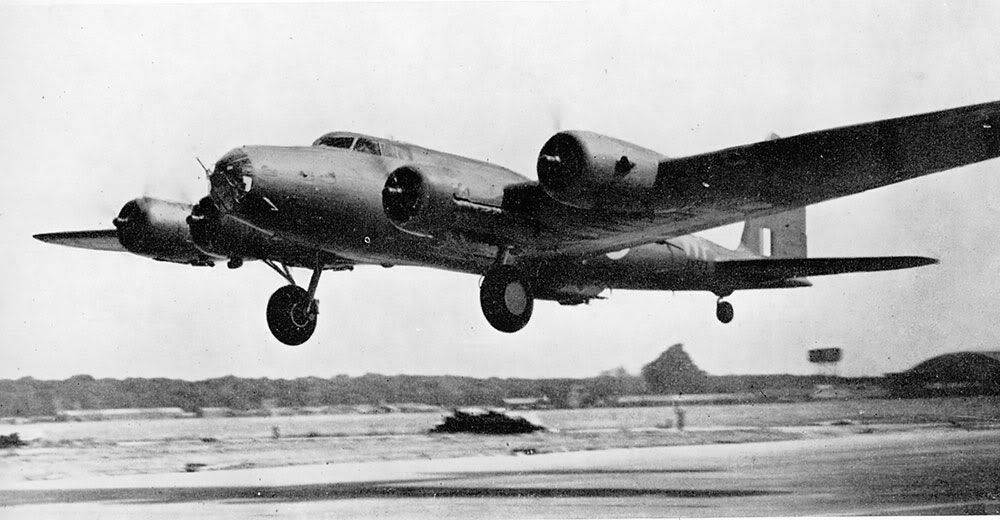 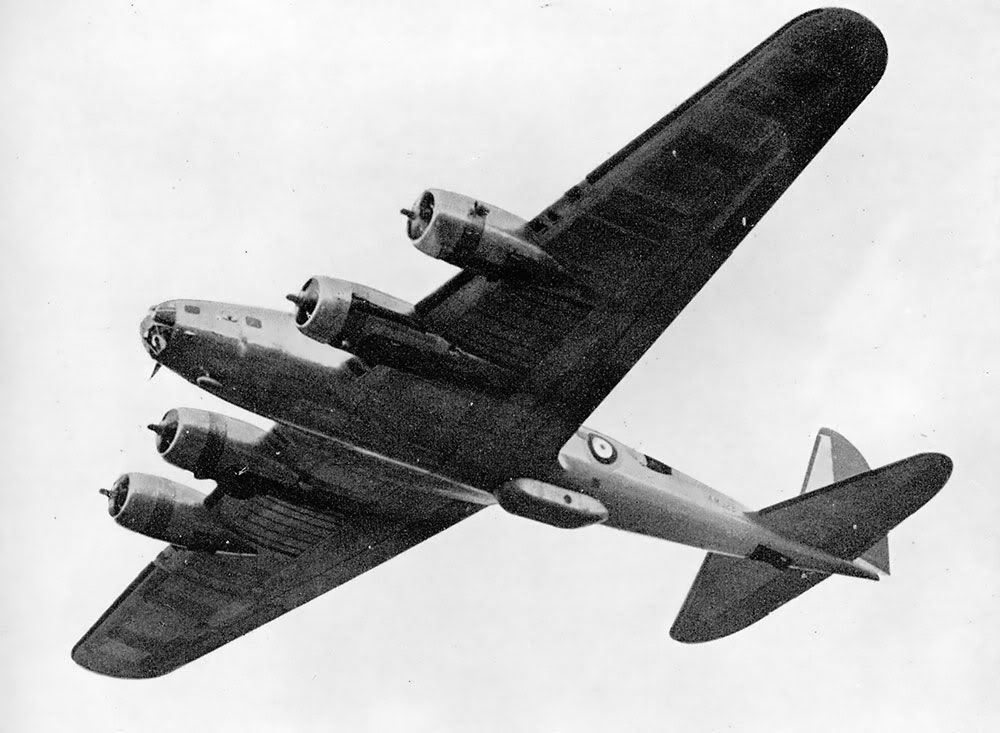 The pictures are from the same book and show the Fortress in RAF use. All in all a harbinger of what was to come.
My 'Waiting for Clod' thread: http://tinyurl.com/bqxc9eeAlways take sides. Neutrality helps the oppressor, never the victim. Silence encourages the tormentor, never the tormented.Elie Wiesel. Romanian born Jewish writer, professor, political activist, Nobel Laureate, Holocaust survivor. 1928 - 2016. Indeed the safest road to Hell is the gradual one - the gentle slope, soft underfoot, without sudden turnings, without milestones, without signposts. C.S. Lewis, 1898 - 1963.
|
|
#3095948 - 09/17/10 08:58 PM
 Re: While we're waiting for BoB SoW: WWII BBC RAF Broadcasts
[Re: RedToo]
Re: While we're waiting for BoB SoW: WWII BBC RAF Broadcasts
[Re: RedToo]
|
Joined: Nov 2005
Posts: 3,070
RedToo

Senior Member
|

Senior Member

Joined: Nov 2005
Posts: 3,070
Bolton UK
|
Part 79. 5. Beaufort v. Battleship Shortly before midnight last night (Thursday) a Blenheim aircraft of coastal command on reconnaissance off the southern coast of Norway sighted an enemy pocket battleship escorted by a number of destroyers. A striking force was despatched by coastal command and in the early hours of this morning the battleship, then off Egersund, was hit by a torpedo from a Beaufort aircraft. Dense clouds of white smoke rose from the vessel and prevented accurate observation by other aircraft of the results of their attacks. (Air Ministry Communique.) FRIDAY, JUNE 13TH was not a lucky day for the German Navy. A Coastal Command Beaufort aircraft, of which I was the pilot, obtained a direct hit with a torpedo on a German pocket battleship as it was slinking out past Norway, and sent it, with its attendant destroyers, back home. When it was getting near midnight on Thursday we had orders to push off with other aircraft from the squadron. Somebody mentioned that it would soon be the 13th, and when my wireless operator found that we had to take pigeon container No. 13 he said, �We�re bound to be lucky." Carrying our torpedo slung beneath us, we started off in formation. There was a bit of moon, but it was partly obscured and shone through the haze only occasionally. In some patches of cloud you could see hardly anything, but it was fairly light in the clear spaces. We were well over the North Sea when midnight came. We were flying pretty high as we approached the coast of Southern Norway and found several gaps in the clouds where the moon was breaking through. You could see the surface of the water and, as we came into one of these clearings, we suddenly spotted a formation of enemy warships away down under the star-board wing. The white washes trailing behind them caught our eyes first, and then we saw the ships' small black slim shapes. They were arranged in a very nice formation with the pocket battleship in the middle and her five escorting destroyers dispersed around her. One destroyer was right ahead of the battleship and there were two more destroyers on each side, making a pretty effective screen. We dived to get into position from which to attack. We came down to a few hundred feet above the sea and flew at right angles across the stern of two destroyers bringing up at the rear. That put us on the broadside of the formation. We made a right-about turn to starboard and came straight back on its beam. There was not much time to think about attacks. One destroyer was right in our way and I had to skid round its stern to get a suitable angle to drop. We were close enough to the destroyer to see the design of its camouflage, outlines of the deck fittings, and even the rail. The next second I put the nose of the aircraft round and saw the battleship in my sight. I pressed a button on the throttle which released the torpedo�and away it went. As soon as the torpedo had gone I made a sharp turn to port and opened my engine flat out. I was expecting a barrage of flak at any moment. The navigator beside me was looking back at the ship saying, �It�s coming, it's coming." But fortunately the flak did not come, not even when, for one unpleasant moment, we found ourselves in a vertical turn round one of the destroyers where we should have been easy meat. I think our attack must have taken them completely by surprise. All this time the torpedo was running on its course and really only a few seconds had elapsed. As we flew clear from the ship, the rear gunner and the wireless operator shouted together over the inter-com., �You�ve hit it. There's a great column of water going up, and dirty white smoke." I flew round in a circle to see for myself, and sure enough there was plenty of smoke and a patch of foam on the ship's track. Naturally I didn't want to hang around too long, so when we were satisfied with the results of our attack, we made a signal reporting it. When we got back home we heard that other aircraft had found the German force after we had attacked it. The ships had stopped by then and were trying to hide themselves behind the smoke-screen made by the destroyer. Still later we learned that the formation had turned back to the Skagerrak and was limping home at reduced speed. 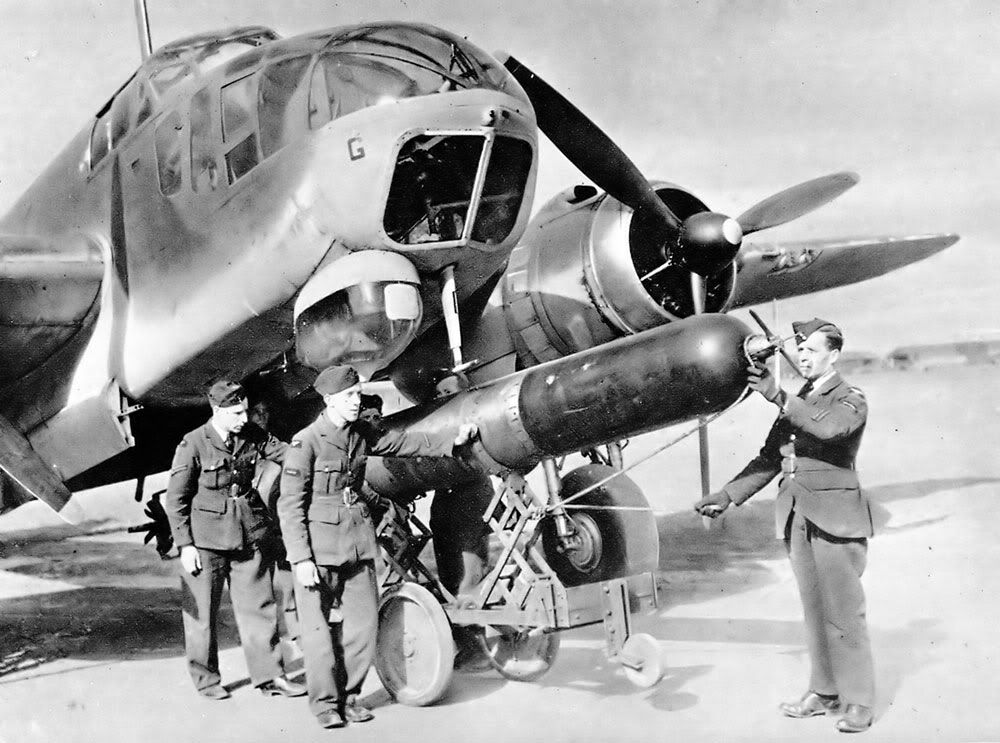 A torpedo is loaded on a Beaufort of Coastal Command. 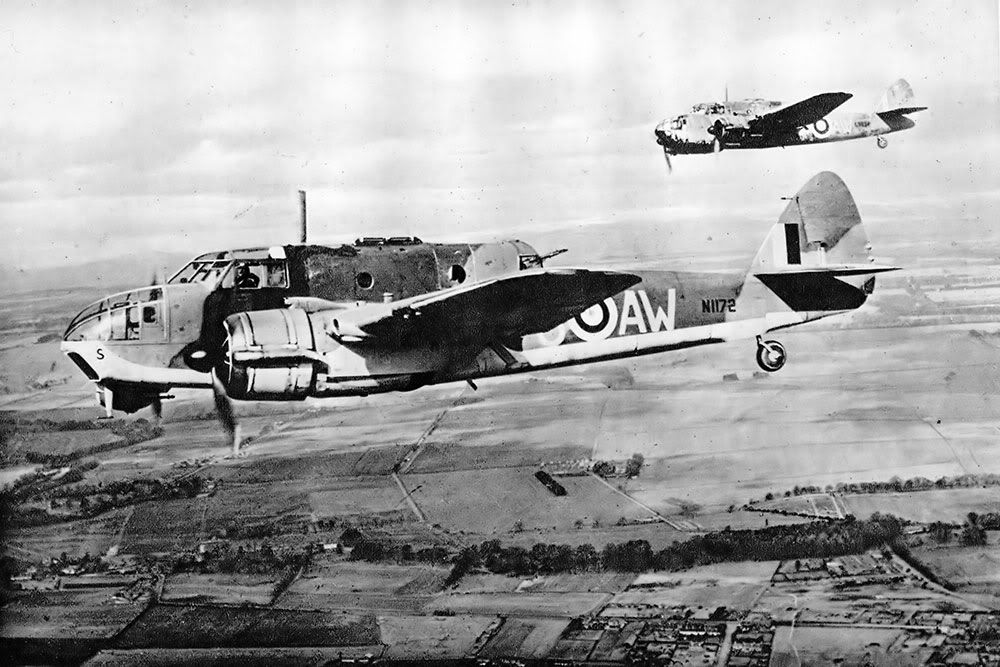 Bristol Beaufort torpedo-bombers set out.
Last edited by RedToo; 09/17/10 09:06 PM.
My 'Waiting for Clod' thread: http://tinyurl.com/bqxc9eeAlways take sides. Neutrality helps the oppressor, never the victim. Silence encourages the tormentor, never the tormented.Elie Wiesel. Romanian born Jewish writer, professor, political activist, Nobel Laureate, Holocaust survivor. 1928 - 2016. Indeed the safest road to Hell is the gradual one - the gentle slope, soft underfoot, without sudden turnings, without milestones, without signposts. C.S. Lewis, 1898 - 1963.
|
|
#3100736 - 09/24/10 09:09 PM
 Re: While we're waiting for BoB SoW: WWII BBC RAF Broadcasts
[Re: RedToo]
Re: While we're waiting for BoB SoW: WWII BBC RAF Broadcasts
[Re: RedToo]
|
Joined: Nov 2005
Posts: 3,070
RedToo

Senior Member
|

Senior Member

Joined: Nov 2005
Posts: 3,070
Bolton UK
|
Part 80. 6. The Attack on Aalesund The harbour and anchorages of the Norwegian port of Aalesund�one of the bases from which Hitler supplies his Northern Russian front�were wreathed in smoke and flames for hours last night and this morning following the most devastating shipping attack ever carried out by a single squadron of the R.A.F. (Air Ministry Bulletin.) IT was still daylight when we set off over the North Sea, but darkness fell while we were on our way across. As we reached the Norwegian coast a bright moon was shining, which lit up the snow-covered mountains and countryside. We crossed an outer belt of small islands before coming to our target, which was shipping in the anchorage at Aalesund. In the anchorage itself there were several medium-sized ships at anchor. We were the second aircraft to arrive on the scene. The first arrival seemed to be drawing plenty of flak, while below him one of the ships was already burning furiously and dense clouds of smoke were drifting across the bay. My crew and I decided it would be best to float round for a time in order to find the best target and then choose the right moment for our attack. So we circled the bay, watching the other Hudsons doing their stuff. Several of them were attacking the ships from only a few feet above the sea, and it was most entertaining for us, at any rate, to watch the multi-coloured flak streaming down-wards at them from the hills around. But the guns didn't seem to be having much luck, and the only targets I could see them hitting were the ships they were supposed to protect. After one of these attacks I noticed a second ship starting to burn. Before long you could see a dull glow from its red-hot plates and then a mass of flames. At the same moment I saw a bomb burst alongside the large fish-oil factory in the harbour. In the meanwhile my crew and I were so fascinated by all, these interesting sights that we almost forgot about our own job. However, by now I had had plenty of opportunity of choosing my own particular target and to decide the best way to attack it. I had selected the biggest ship of the lot, and as it was still afloat, I thought I'd have a shot at dive-bombing her from a good height�especially as the flak was now concentrating entirely on the low-flying aircraft. So we climbed to about 6,000 feet and approached the target area from the sea. About five miles off Aalesund I throttled back, made a silent approach and, when we were almost directly over the ship, shoved my nose down, dropping a stick of heavy bombs right across her. The A.A. gunners must have been completely taken by surprise, as their guns didn't open up on us until we were well away. Then I circled the ship again to have a look at results. At first we saw nothing unusual and thought we'd missed her. But suddenly our Canadian gunner shouted over the inter�com. �I think I can see a glow from right inside the ship," and the next time we looked she was definitely down at the bows. A couple of minutes later the forecastle was well awash; then the water was up to her funnel and the rudder rose clear of the sea. I shouted to my crew, �Her boilers ought to burst any moment now," and sure enough a minute or two later there was a violent explosion amidships. Dense clouds of steam shot up into the air and in a very short while all we could see above the water was the flag flying from her stern, and that very soon disappeared. As we set course for home, fifteen minutes after we had dropped our bombs, all that remained were three boatloads of survivors rowing like hell for the shore. A couple of pics from the German side: 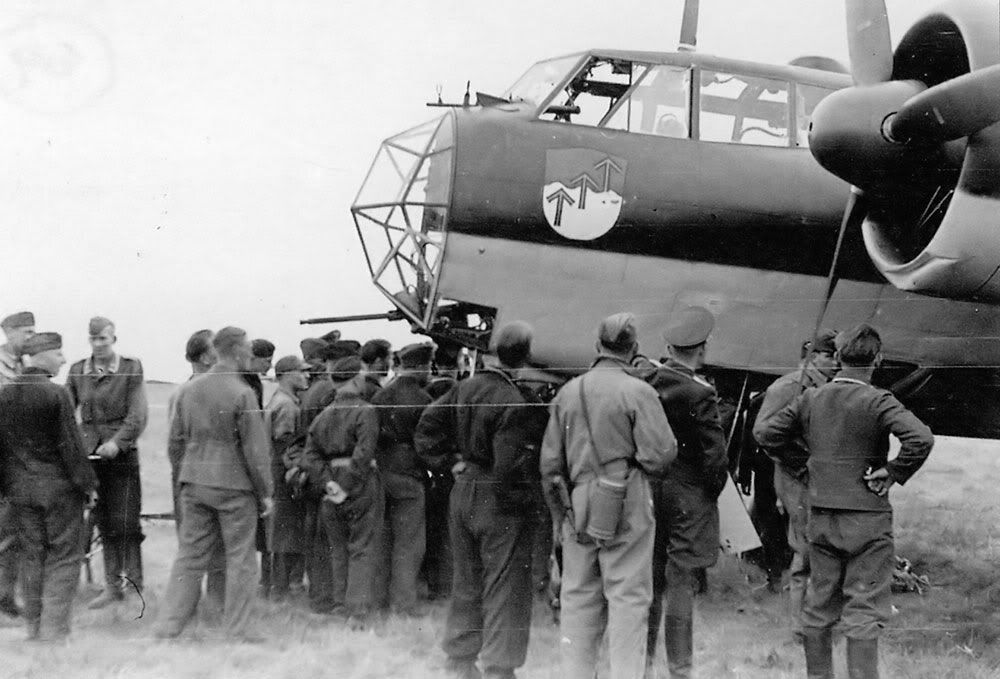 A Do 17 of IInd Gruppe of KG 76, fitted with a 20mm cannon in the nose for strafing ground targets. 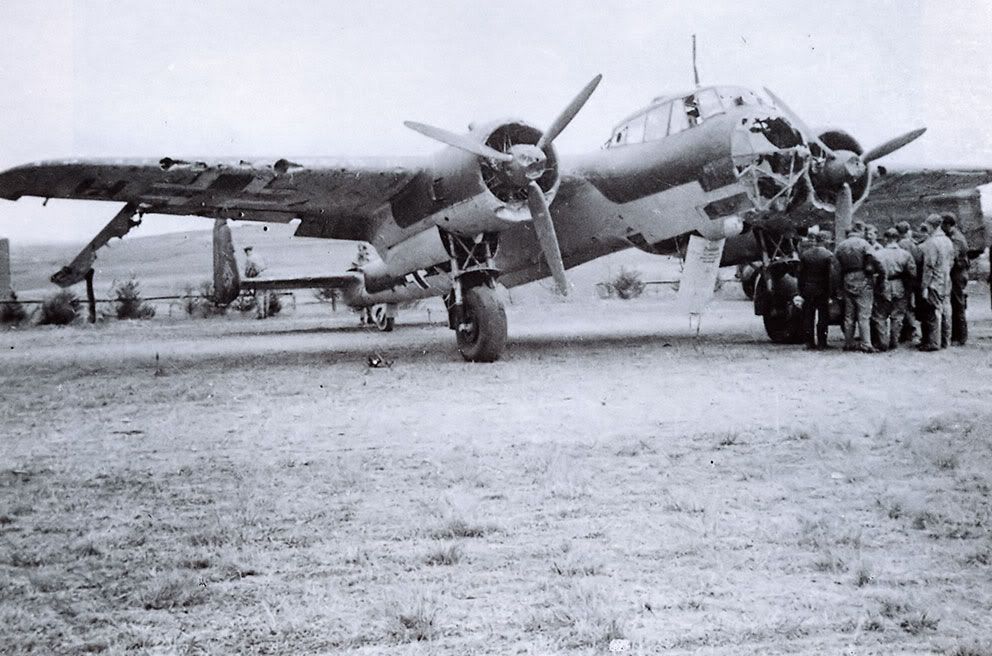 Low level attacks could be a dangerous business. On 17 May 1940 this Do 17 of II./KG 76 was strafing a French road convoy when an ammunition truck exploded violently. The German bomber suffered extensive damage, but the pilot, Unteroffizer Otto Stephani, was able to make a normal landing at his base in Vogelsang. The Dornier never flew again.
My 'Waiting for Clod' thread: http://tinyurl.com/bqxc9eeAlways take sides. Neutrality helps the oppressor, never the victim. Silence encourages the tormentor, never the tormented.Elie Wiesel. Romanian born Jewish writer, professor, political activist, Nobel Laureate, Holocaust survivor. 1928 - 2016. Indeed the safest road to Hell is the gradual one - the gentle slope, soft underfoot, without sudden turnings, without milestones, without signposts. C.S. Lewis, 1898 - 1963.
|
|
#3105395 - 10/01/10 07:22 PM
 Re: While we're waiting for BoB SoW: WWII BBC RAF Broadcasts
[Re: RedToo]
Re: While we're waiting for BoB SoW: WWII BBC RAF Broadcasts
[Re: RedToo]
|
Joined: Nov 2005
Posts: 3,070
RedToo

Senior Member
|

Senior Member

Joined: Nov 2005
Posts: 3,070
Bolton UK
|
Part 81. 7. Sweeps Over France An Irish flight lieutenant who was recently awarded a second bar to his D.F.C. and who leads a flight of a famous Australian squadron shot down his 21st enemy aircraft to-day (Thursday), just a few days before his 21st birthday. (Air Ministry Bulletin.) I'VE been on about fifty sweeps, and most of my victories have been gained over France. I've got my bag because I've been blessed with a pair of good eyes, and have learned to shoot straight. I've not been shot down�touch wood� and I've only once been badly shot up (I hope that doesn't sound Irish). And for all that I've got a lot to thank the pilots in my section. They are Australians and I've never met a more loyal or gamer crowd of chaps. They've saved my bacon many a time when I've been attacked from behind while concentrating on a Messerschmitt in front of me, and they've followed me through thick and thin. On the ground they're the cheeriest friends a fellow could have. I'm sure that Australia must be a grand country if it's anything like its pilots, and after the war I'm going to see it. No, not flying, or farming. I like a job with figures�accountancy or auditing. Perhaps that doesn't sound much like a fighter pilot. But pilots are perfectly normal people. Before going off on a trip I usually have a funny feeling in my tummy, but once I'm in my aircraft everything is fine. The brain is working fast, and if the enemy is met it seems to work like a clockwork motor. Accepting that, rejecting that, sizing up this, and remembering that. You don't have time to feel anything. But your nerves may be on edge� not from fear, but from excitement and the intensity of the mental effort. I have come back from a sweep to find my shirt and tunic wet through with perspiration. Our chaps sometimes find that they can't sleep. What happens is this. You come back from a show and find it very hard to remember what happened. Maybe you have a clear impression of three or four incidents, which stand out like illuminated lantern slides in the mind's eye. Perhaps a picture of two Me. 109's belting down on your tail from out of the sun and already within firing range. Perhaps another picture of your cannon shells striking at the belly of an Me. and the aircraft spraying debris around. But for the life of you, you can't remember what you did. Later, when you have turned in and sleep is stealing over you, some tiny link in the forgotten chain of events comes back. Instantly you are fully awake, and then the whole Story of the operation pieces itself together and you lie there, sleep driven away, re-living the combat, congratulating your�self for this thing, blaming yourself for that. The reason for this is simply that everything happens so quickly in the air that you crowd a tremendous amount of thinking, action and emotion into a very short space of time, and you suffer afterwards from mental indigestion. The other week I was feeling a little jaded. Then my seven days' leave came round, and I went back bursting with energy. On my first flight after getting back I shot down three Me.'s in one engagement, and the next day bagged two more. That shows the value of a little rest. It's a grand life, and I know I'm lucky to be among the squadrons that are carrying out the sweeps. The tactical side of the game is quite fascinating. You get to learn, for instance, how to fly so that all the time you have a view behind you as well as in front. The first necessity in combat is to see the other chap before he sees you, or at least before he gets the tactical advantage of you. The second is to hit him when you fire. You mightn't have a second chance. After a dog-fight your section gets split up, and you must get together again, or tack on to others. The straggler is easy meat for a bunch of Jerries. Luckily, the chaps in my flight keep with me very well, and we owe a lot to it. On one occasion recently I saw an Me. dive on to one of my flight. As I went in after him, another Me. tailed in behind to attack me, but one of my flight went in after him. Soon half a dozen of us were flying at 400 m.p.h. in line astern, everybody, except the leader, firing at the chap in front of him. I got my Hun just as my nearest pal got the Hun on my tail, and we were then three Spitfires in the lead. When we turned to face the other Me.'s we found that several others had joined in, but as we faced them they turned and fled. The nearest I've been to being shot down was when another pilot and I attacked a Ju. 88. The bomber went down to sea level, so that we could only attack from above, in face of the fire of the Ju.'s rear guns. We put that Ju. into the sea all right, but I had to struggle home with my aircraft riddled with bullets and the undercarriage shot away. I force-landed without the undercarriage, and was none the worse for it. But it wasn't very nice at the time. Well, as I said just now, one day I'm planning to go to Australia�and audit books. 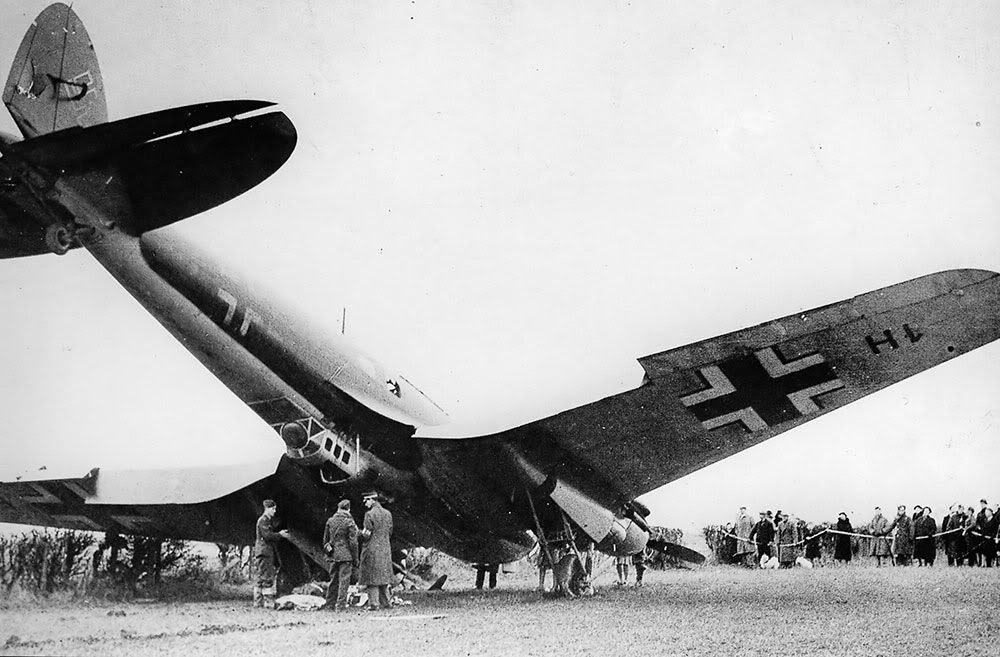 This He-111 crashed in the North East of England 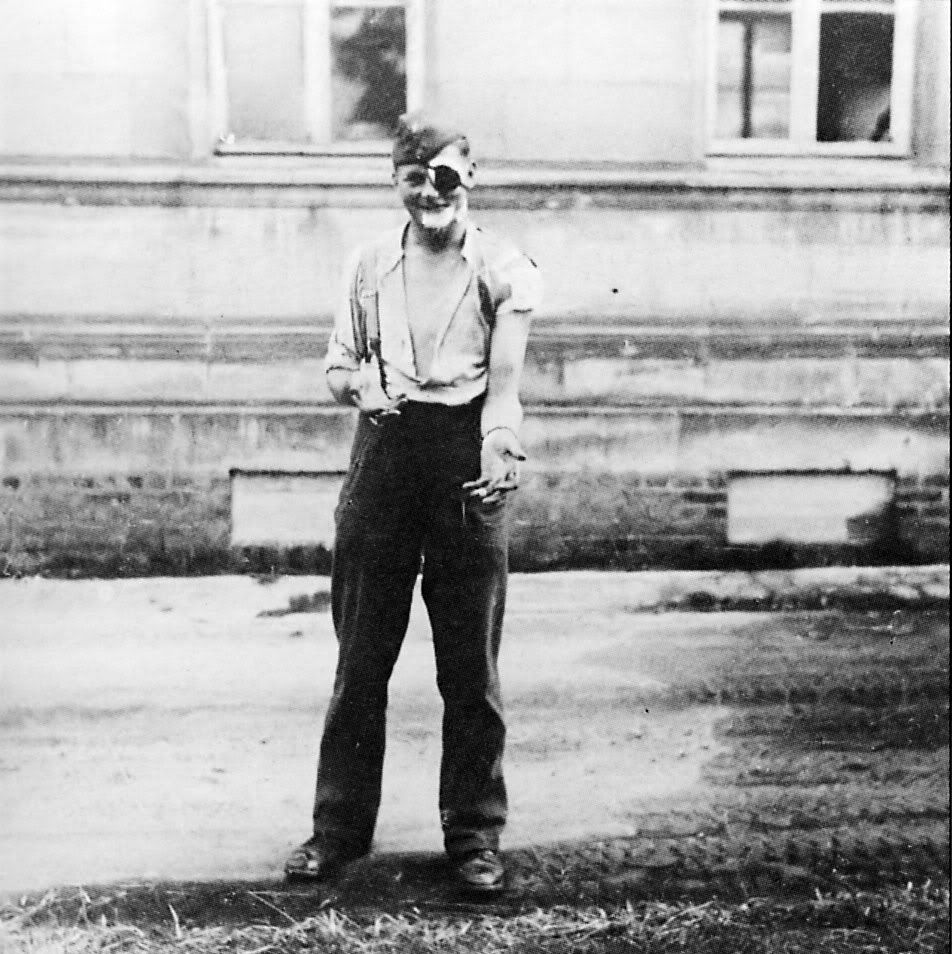 Unteroffizier Karl Meier, a radio operator with I./StG 7. During the attack on Thorney Island his aircraft was attacked by British fighters. He suffered eight hits on his body from British machine-gun rounds, but escaped with only flesh wounds.
Last edited by RedToo; 10/01/10 07:23 PM.
My 'Waiting for Clod' thread: http://tinyurl.com/bqxc9eeAlways take sides. Neutrality helps the oppressor, never the victim. Silence encourages the tormentor, never the tormented.Elie Wiesel. Romanian born Jewish writer, professor, political activist, Nobel Laureate, Holocaust survivor. 1928 - 2016. Indeed the safest road to Hell is the gradual one - the gentle slope, soft underfoot, without sudden turnings, without milestones, without signposts. C.S. Lewis, 1898 - 1963.
|
|
#3110610 - 10/08/10 08:01 PM
 Re: While we're waiting for BoB SoW: WWII BBC RAF Broadcasts
[Re: RedToo]
Re: While we're waiting for BoB SoW: WWII BBC RAF Broadcasts
[Re: RedToo]
|
Joined: Nov 2005
Posts: 3,070
RedToo

Senior Member
|

Senior Member

Joined: Nov 2005
Posts: 3,070
Bolton UK
|
Part 82. 8. Condor Written Off A Focke-Wulf Condor, on the way to attack Atlantic convoys, was intercepted to-day by a Lockheed Hudson of the R.A.F. Coastal Command ... (Air Ministry Bulletin.) THE Focke-Wulf which we disposed of is by no means the first one to have been shot down in the Battle of the Atlantic. But this time it happens to have been written off by one of the Hudson squadrons which are now in action day and night over the wide battlefield of the Western Ocean. My crew and I have been on the job of escorting and pro�tecting convoys in the Atlantic for months past. It's largely monotonous work, helping to keep the shipping lanes safe�arduous and unspectacular work which has to be done mostly in wretched weather conditions so far as visibility is concerned. It is work that doesn't often come into the news. It's a real case of no news being good news. While the convoys are going through safely without molestation from the air or from surface raiders and U-boats, there is no news. All is well. But my crew and I were longing for some liveliness. The other day we got a real packet of it. It happened like this. Away out in the Atlantic, hours after dawn, we made our rendezvous with the convoy and the escorting warships. We did our usual stuff over them for more than a couple of hours, circling round and round in wide sweeps looking for possible danger. There wasn't a sign of anything in the air or on the sea. My relief was well on the way out and my fuel was getting a bit low, so I signalled �Good-bye and good luck" to the convoy. I was just setting course for home when something�I don't know what�told me to have a final look round. So I made another wide circuit of the ships. I was half-way round when one of the escorting warships spelt out a signal to me with its lamp. The message read, �Suspicious aircraft to starboard." We flew on for a bit and sighted an aircraft about four miles away. It was flying very low, just above the sea, and on a steady course towards the convoy, taking good advan�tage of the very low cloud over the Atlantic. It was just a dot at first�but obviously a big fellow. I went on to have a look at him. Just as a precaution, I pulled down my front gun sights, and mentioned to my co-pilot that I had the stranger beautifully in my sights. He suddenly let out an Irish yell. �Hi! It�s a blinking Condor!� he cried. He was jolly well right, too. It was a Focke-Wulf Condor painted sea-green as camouflage. The big German was going straight for the convoy and was now only two miles from it. The second pilot ran back to man the side gun of the Hudson. I went all out on the throttle and at 1,100 feet began to dive. Four hundred yards away I was wondering who would fire first. At that moment the German and I began firing simultaneously, but my front guns didn't seem to be doing him any damage. The enemy's shooting was bad. Not one of his bullets or cannon shells hit us then or afterwards. I brought my Hudson still lower and got into position 200 yards away to give my rear gunner a chance. He took it beautifully and promptly. I could see the tracer bullets from his tail gun whipping into the Focke-Wulf's two port engines and into its fuselage about mid-wing. We got closer still�actually to between 20 and 30 feet�so close that the Focke-Wulf looked like a house. All the time my tail-gunner's tracers were still ripping into the Jerry. When there was only 8 yards between us we saw a gun poked out from a window of the Focke-Wulf. A face appeared above it, but it wasn't there long. The second pilot saw the face and spoiled it with a burst from one of his side guns. By this time two of the four engines of the Focke-Wulf were in a glow. The German turned. As he did so he showed us his belly. My tail and side guns absolutely raked it. I made a tight turn the other way. When the Hudson came out of it, I saw the German about a mile away still flying apparently all right. We know that these big Focke-Wulfs are built to give and take heavy punishment. But I was amazed that this fellow could still fly at all after the hiding we had given him. I set off after him again, but the chase didn't last long. The Focke-Wulf soon crashed into the sea. It pancaked on the water, and we could see five members of its crew swimming from the wreckage and another one scampering along the fuselage. We went round them a few times until we saw the six survivors hanging on to a rubber dinghy. The last we heard was that they were picked up by one of our warships. We had a last look at the convoy. Every man on board the warships and merchant vessels, from captains to cooks, seemed to be on deck, waving and signalling their thanks for the grandstand view of the end of another Focke-Wulf. My relief was now in sight and so I made for home. Two pics of the same Condor in the Atlantic: 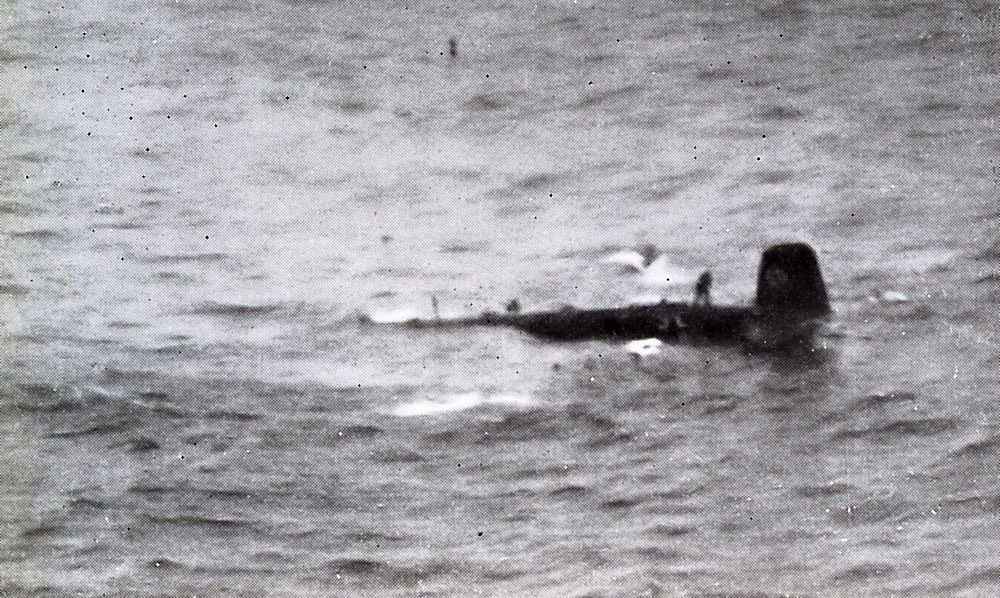 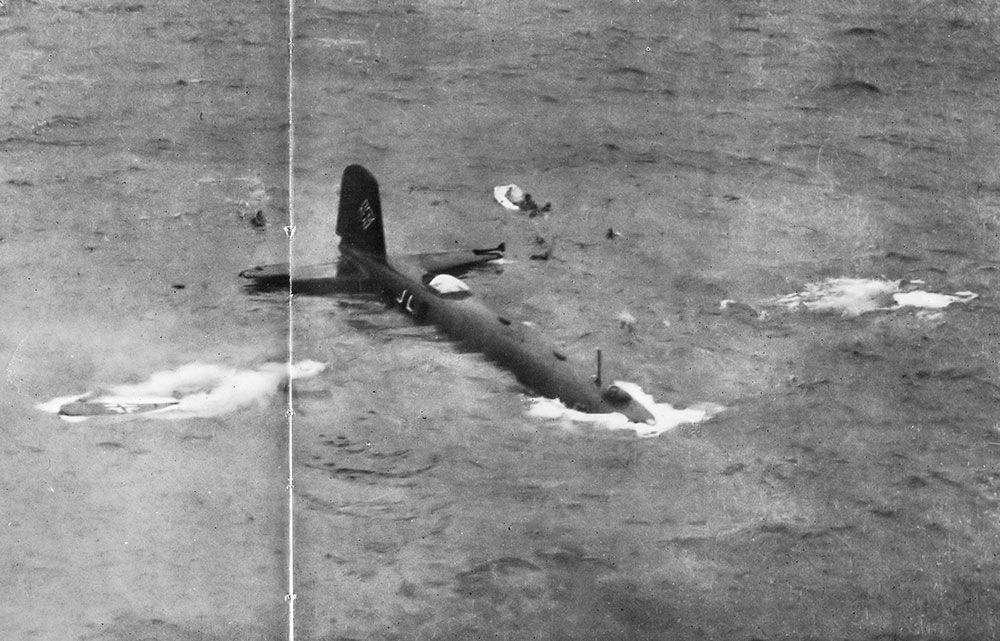
|
|
#3116324 - 10/15/10 07:21 PM
 Re: While we're waiting for BoB SoW: WWII BBC RAF Broadcasts
[Re: RedToo]
Re: While we're waiting for BoB SoW: WWII BBC RAF Broadcasts
[Re: RedToo]
|
Joined: Nov 2005
Posts: 3,070
RedToo

Senior Member
|

Senior Member

Joined: Nov 2005
Posts: 3,070
Bolton UK
|
Part 83. 9. Night Fighter Of the 33 enemy raiders destroyed last night it is now established that four were brought down by A.A. guns. The remaining 29 fell to the guns of the R.A.F. night-fighter pilots�. Our night-fighting forces took full advantage of the brilliant moonlight. (Air Ministry Bulletin.) Try to imagine the moonlight sky, with a white back ground of snow nearly six miles below. Somewhere near the centre of a toy town a tiny flare is burning. Several enemy bombers have come over, but only one fire has gained a hold. After all the excitement of my two combats, I can still see that amazing picture of London clearly in my mind. It was indeed the kind of night that we fly-by-nights pray for. I had been up about three-quarters of an hour before I found an enemy aircraft. I had searched all round the sky when I suddenly saw him ahead of me. I pulled the boost control to get the highest possible speed and catch him up. I felt my Hurricane vibrate all over as she responded and gave her maximum power. I manoeuvred into position where I could see the enemy clearly with the least chance of his seeing me. As I caught him up I recognised him�a Dornier �flying pencil." Before I spotted him I had been almost petrified with the cold. I was beginning to wonder if I should ever be able to feel my hands, feet or limbs again. But the excitement warmed me up. He was now nearly within range and was climbing to 30,000 feet. I knew the big moment had come. I daren't take my eyes off him, but just to make sure that everything was all right I took a frantic glance round the " office "� that's what we call the cockpit�and checked everything. Then I began to close in on the Dormer and found I was travelling much too fast. I throttled back and slowed up just in time. We were frighteningly close. Then I swung up, took aim, and fired my eight guns. Almost at once I saw little flashes of fire dancing along the fuselage and centre section. My bullets had found their mark. I closed in again, when suddenly the bomber reared up in front of me. It was all I could do to avoid crashing into him. I heaved at the controls to prevent a collision, and in doing so I lost sight of him. I wondered if he was playing pussy and intending to jink away, come up on the other side and take a crack at me, or whether he was hard hit. The next moment I saw him going down below me with a smoke trail pouring out. Some of you may have seen that smoke trail. I felt a bit disappointed, because it looked as if my first shots had not been as effective as they appeared. Again I pulled the boost control and went down after him as fast as I knew how. I dived from 30,000 feet to 3,000 feet at such a speed that the bottom panel of the aircraft cracked, and as my ears were not used to such sudden changes of pressure I nearly lost the use of one of the drums. But there was no time to think of these things. I had to get that bomber. Then as I came nearer I saw he was on fire. Little flames were flickering around his fuselage and wings. Just as I closed in again he jinked away in a steep climbing turn. I was going too fast again, so I pulled the stick back and went up after him in a screaming left-hand climbing turn. When he got to the top of his climb I was almost on him. I took sight very carefully and gave the button a quick squeeze. Once more I saw little dancing lights on his fuselage, but almost instantaneously they were swallowed in a burst of flames. I saw him twist gently earthwards and there was a spurt of fire as he touched the earth. He blew up and set a copse blazing. I circled down to see if any of the crew had got out, and then I suddenly remembered the London balloon barrage, so I climbed up and set course for home. I had time now to think about the action. My windscreen was covered with oil, which made flying uncomfortable, and I had a nasty feeling that I might have lost bits of my aircraft. I remembered seeing bits of Jerry flying past me. There were several good-sized holes in the fabric, which could have been caused only by hefty lumps of Dornier. Also the engine seemed to be running a bit roughly, but that turned out to be my imagination. Anyway I soon landed, reported what had happened, had some refreshment, and then up in the air once more, southward ho ! for London. Soon after I was at 17,000 feet. It's a bit warmer there than at 30,000. I slowed down and searched the sky. The next tiling I knew, a Heinkel was sitting right on my tail. I was certain he had seen me, and wondered how long he had been trailing me. I opened my throttle, got round on his tail and crept up. When I was about 400 yards away he opened fire�and missed me. I checked my gadgets, then I closed up and snaked about so as to give him as difficult a target as possible. I got into a firing position, gave a quick burst of my guns and broke away. I came up again, and it looked as if my shots had had no effect. Before I could fire a second time, I saw his tracer bullets whizzing past me. I fired back and I knew at once that I had struck home. I saw a parachute open up on the port wing. One of the crew was baling out. He was quickly followed by another. The round white domes of the parachutes looked lovely in the moonlight. It was obvious now that the pilot would never get his aircraft home, and I, for my part, wanted this second machine to be a �certainty" and not a " probable." So I gave another quick burst of my guns. Then to fool him I attacked from different angles. There was no doubt now that he was going down. White smoke was coming from one engine, but he was not yet on fire. I delivered seven more attacks, spending all my ammunition. Both his engines smoked as he got lower and lower. I followed him down a long way and as he flew over a dark patch of water I lost sight of him. But I knew he had come down, and where he had come down�it was all confirmed later�and I returned to my base ready to tackle another one. But they told me all the Jerries had gone home. �Not all," I said, "two of them are here for keeps." Shooting practice for pilots of JG26 during the Battle of Britain: 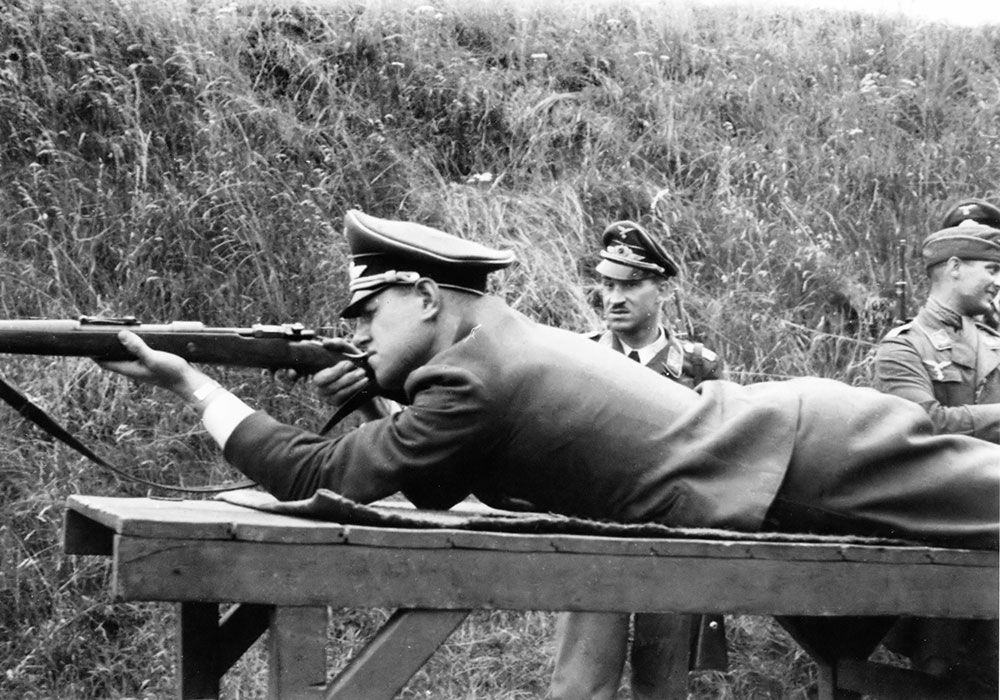 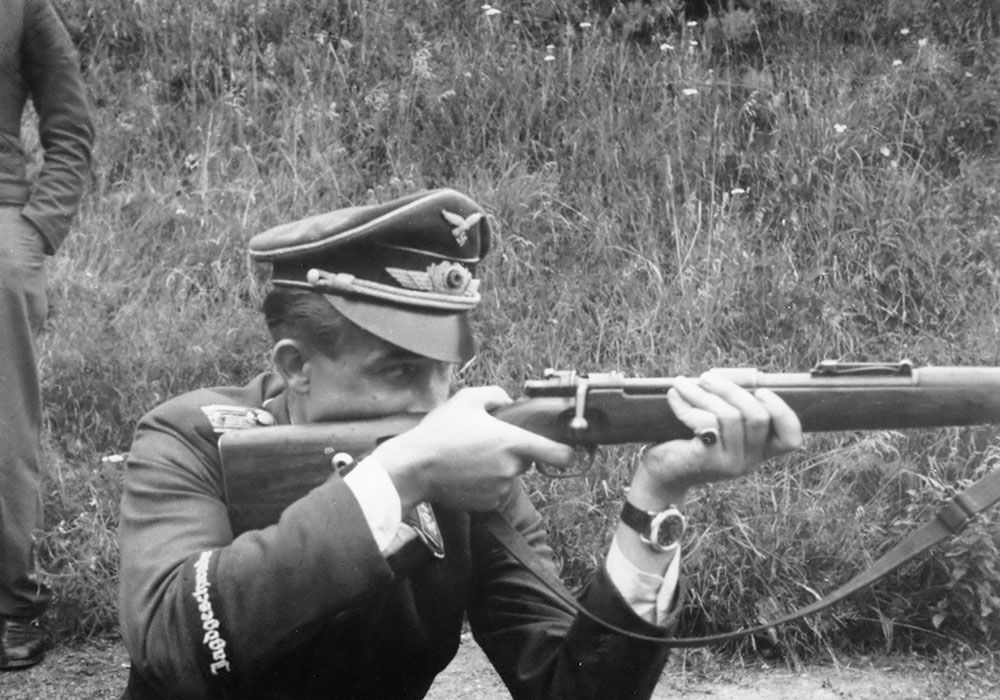 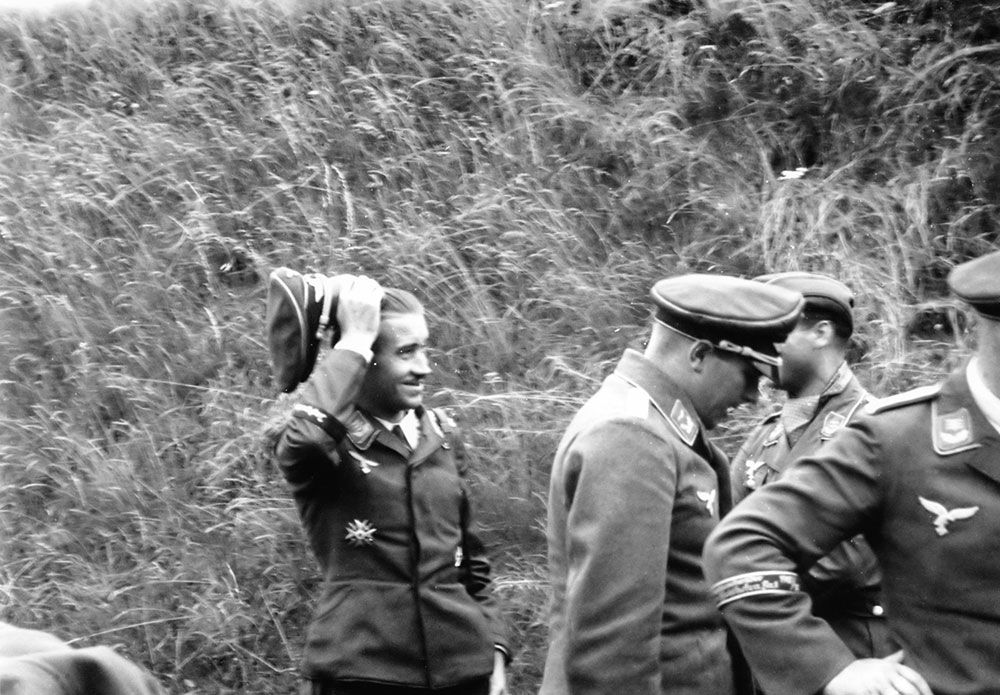
Last edited by RedToo; 10/15/10 07:23 PM.
My 'Waiting for Clod' thread: http://tinyurl.com/bqxc9eeAlways take sides. Neutrality helps the oppressor, never the victim. Silence encourages the tormentor, never the tormented.Elie Wiesel. Romanian born Jewish writer, professor, political activist, Nobel Laureate, Holocaust survivor. 1928 - 2016. Indeed the safest road to Hell is the gradual one - the gentle slope, soft underfoot, without sudden turnings, without milestones, without signposts. C.S. Lewis, 1898 - 1963.
|
|
#3121367 - 10/22/10 07:31 PM
 Re: While we're waiting for BoB SoW: WWII BBC RAF Broadcasts
[Re: RedToo]
Re: While we're waiting for BoB SoW: WWII BBC RAF Broadcasts
[Re: RedToo]
|
Joined: Nov 2005
Posts: 3,070
RedToo

Senior Member
|

Senior Member

Joined: Nov 2005
Posts: 3,070
Bolton UK
|
Part 84. 10. Canada Hits the Target A Canadian sergeant�one of the first batch to arrive in this country under the empire training scheme�to-day sunk a German supply ship of about 2,500 tons with a direct bomb hit on the stern. (Air Ministry Bulletin.) WHEN I was training out in Canada we used to practise dropping small bombs on little wooden targets in Lake Ontario. And, of course, when we did so we all thought of the day when we would be dropping rather larger bombs on real targets with Germans in them. This thought didn't seem to improve my aim much, however, for try as hard as I could I never actually succeeded in scoring a direct hit on those little targets in Lake Ontario. But the day I used to think about over in Canada has now arrived, and I am going to give you an account of it. When we took off there weren't many clouds to give us cover, and as we got nearer to the Dutch coast the clouds grew fewer. We made our landfall and turned to fly along the coast towards the Hook. And there, about three miles out from the mouth of the river, we saw a German supply ship well down in the water as though she were carrying a heavy cargo. Because there was so little cloud cover, we were rather high up for bombing, but we decided to have a crack at it. " We'll make a run over, anyway," said the pilot, who incidentally is also a Canadian. I got down to the bomb-sight and started to adjust it for height and drift, while the pilot made almost a perfect run up. I only had to give him one correction in course. The ship, by the way, was firing at us by then with the gun on her bows, and several shore batteries were opening up, too. Black clouds of high explosive were forming a little way from us. The first time I saw them I didn't realise what was happening. �Those are funny looking clouds ahead of us," I said to the pilot. �Boy!� he replied, �those aren't clouds!� But to continue, I was adjusting my bomb-sight and everything seemed to fit in perfectly. Just as I got the final adjustments made the ship seemed to fall plump into the sights, so I released a single heavy bomb�the first bomb I had dropped over here. The ship swung round to take avoiding action and swung her stern right under the bomb. I saw it explode, a direct hit on the stern�which was more than I ever did to those little targets on Lake Ontario. The explosion was followed by a big cloud of black smoke. I found myself shouting with excitement. The gunner too was singing out, �It�s a hit�it's a hit!" The pilot said, �I do think you might have dropped it down her funnel." Then there was another explosion on the ship, with a cloud of white steam this time. Her boilers had burst. I know what that looks like, because I once saw a ship's boilers burst on the Canadian lakes when I was working as a steward on an excursion steamer in the summer, to pay my way through college in the Fall. We did not have much time to enjoy our excitement, because just then the gunner called out a warning that there were two Messerschmitts coming. I looked down, and there they were, streaking up at us. So we climbed into some cloud and flew around until we figured we'd lost them. But, just before we went into the cloud, the gunner saw that the ship was sinking rapidly by the stern. Then we flew back to our base in England�and I had dropped my first bomb. 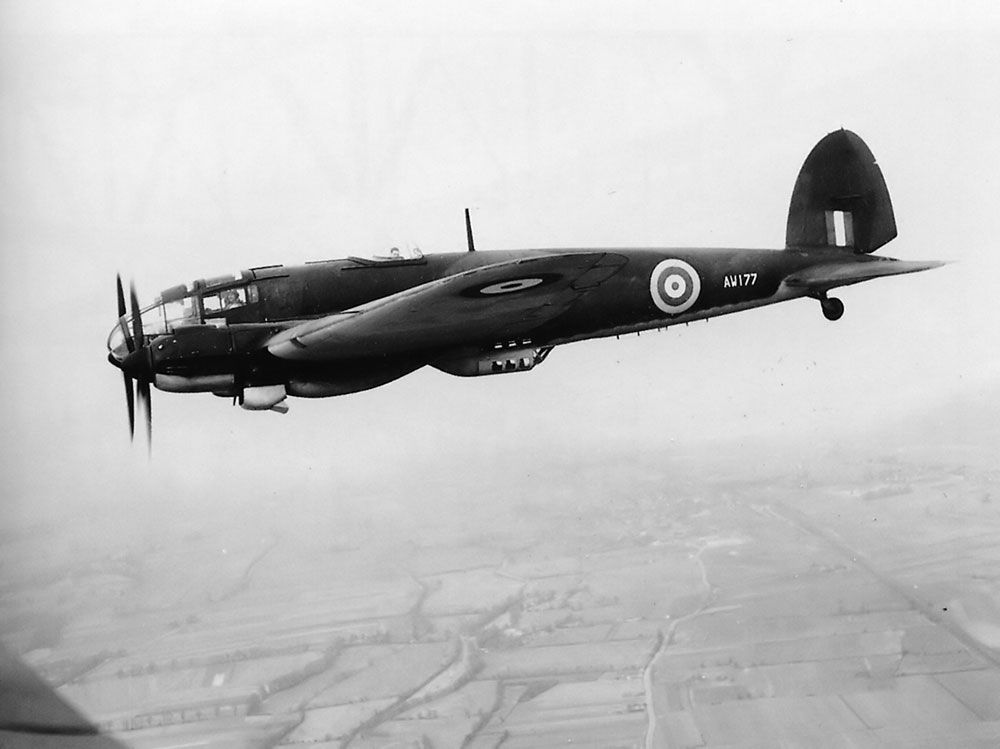 This HE-111 H1 coded IH+EN of II./ Kampfgeschwader 26 force-landed on the 9th of February 1940 near Dalkeith in Midlothian, after combat with a Spitfire I of 602 (City of Glasgow) Squadron. It was repaired, given RAF roundels and the serial AW177, and used for testing purposes. 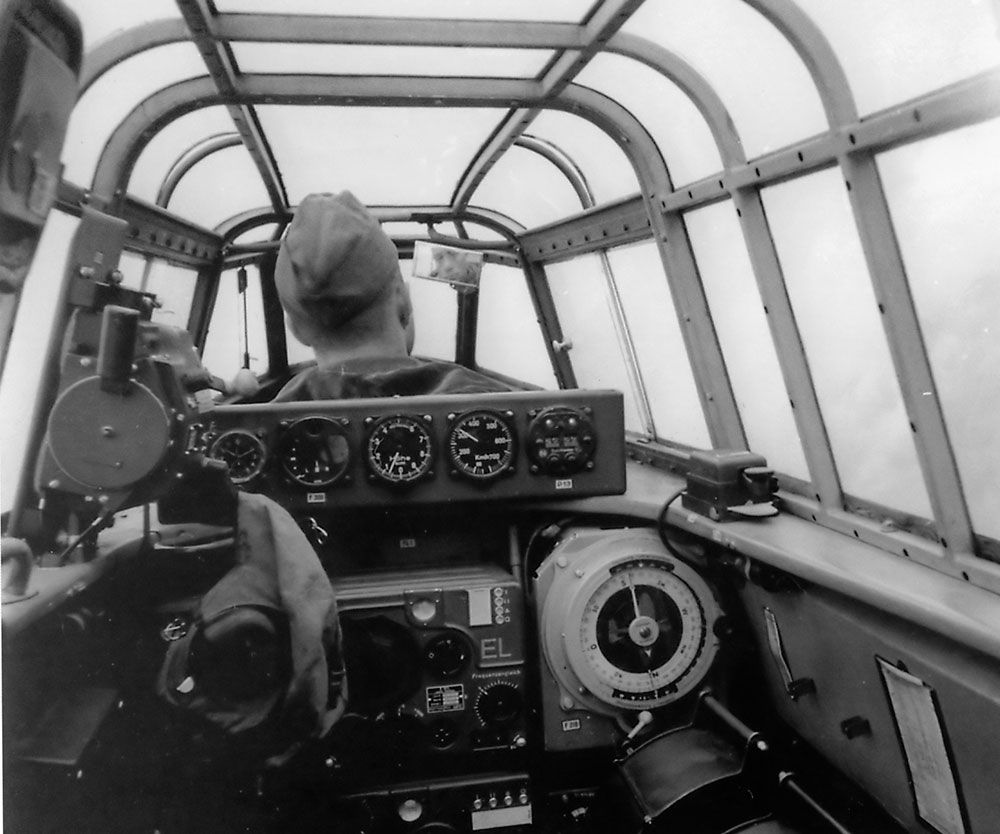 The cockpit of a Messerschmitt Bf 110 from the radio operator/ rear gunners position, November 1940.
Last edited by RedToo; 10/22/10 07:32 PM. Reason: Typo.
My 'Waiting for Clod' thread: http://tinyurl.com/bqxc9eeAlways take sides. Neutrality helps the oppressor, never the victim. Silence encourages the tormentor, never the tormented.Elie Wiesel. Romanian born Jewish writer, professor, political activist, Nobel Laureate, Holocaust survivor. 1928 - 2016. Indeed the safest road to Hell is the gradual one - the gentle slope, soft underfoot, without sudden turnings, without milestones, without signposts. C.S. Lewis, 1898 - 1963.
|
|
#3126648 - 10/29/10 07:16 PM
 Re: While we're waiting for BoB SoW: WWII BBC RAF Broadcasts
[Re: RedToo]
Re: While we're waiting for BoB SoW: WWII BBC RAF Broadcasts
[Re: RedToo]
|
Joined: Nov 2005
Posts: 3,070
RedToo

Senior Member
|

Senior Member

Joined: Nov 2005
Posts: 3,070
Bolton UK
|
Part 85. 11. Starboard Wing on Fire. The king has been graciously pleased to confer the Victoria Cross on the undermentioned airman in recognition of most conspicuous bravery: NZ/401793 Sergeant -------- Royal New Zealand Air Force-No. 75 (N.Z.) Squadron. On the night of 7th July, 1941, Sergeant --------- was second pilot of a Wellington returning from an attack on Munster. . . . (Air Ministry Bulletin.) It was on one of the Munster raids that it happened. It had been one of those trips that you dream about�hardly any opposition over the target; just a few searchlights but very little flak�and that night at Munster I saw more fires than I had ever seen before. We dropped our bombs right in the target area and then made a circuit of the town to see what was going on before the pilot set course for home. As second pilot I was in the astro-dome keeping a look-out all round. All of a sudden, over the middle of the Zuider Zee, I saw an enemy machine coming in from port. I called up the pilot to tell him, but our inter-com. had gone phut. A few seconds later, before anything could be done about it, there was a slamming alongside us and chunks of red-hot shrapnel were shooting about all over the place. As soon as we were attacked, the squadron leader who was flying the plane put the nose down to try and dive clear. At that time we didn't know that the rear gunner had got the attacking plane, a Messerschmitt 110, because the inter-com. was still out of action and we couldn't talk to the rear turret. We'd been pretty badly damaged in the attack. The starboard engine had been hit and the hydraulic system had been put out of action, with the result that the undercarriage fell half down, which meant, of course, that it would be useless for landing unless we could get it right down and locked. The bomb doors fell open too, the wireless sets were not working, and the front gunner was wounded in the foot. Worst of all, fire was burning up through the upper surface of the starboard wing where a petrol feed pipe had been split open. We all thought we'd have to bale out, so we put on our parachutes. Some of us got going with the fire extinguisher, bursting a hole in the side of the fuselage so that we could get at the wing, but the fire was too far out along the wing for that to be any good. Then we tried throwing coffee from our flasks at it, but that didn't work either. It might have damped the fabric round the fire, but it didn't put the fire out. By this time we had reached the Dutch coast and were flying along parallel with it, waiting to see how the fire was going to develop. The squadron leader said, �What does it look like to you?� I told him the fire didn't seem to be gaining at all and that it seemed to be quite steady. He said, �I think we'd prefer a night in the dinghy in the North Sea to ending up in a German prison camp." With that he turned out seawards and headed for England. I had a good look at the fire and I thought there was a sporting chance of reaching it by getting out through the astro-dome, then down the side of the fuselage and out on to the wing. Joe, the navigator, said he thought it was crazy. There was a rope there; just the normal length of rope attached to the rubber dinghy to stop it drifting away from the aircraft when it's released on the water. We tied that round my chest, and I climbed up through the astrodome. I still had my parachute on. I wanted to take it off because I thought it would get in the way, but they wouldn't let me. I sat on the edge of the astro-dome for a bit with my legs still inside, working out how I was going to do it. Then I reached out with one foot and kicked a hole in the fabric so that I could get my foot into the framework of the plane, and then I punched another hole through the fabric in front of me to get a hand-hold, after which I made further holes and went down the side of the fuselage on to the wing. Joe was holding on to the rope so that I wouldn't sort of drop straight off. I went out three or four feet along the wing. The fire was burning up through the wing rather like a big gas jet, and it was blowing back just past my shoulder. I had only one hand to work with getting out, because I was holding on with the other to the cockpit cover. I never realised before how bulky a cockpit cover was. The wind kept catching it and several times nearly blew it away and me with it. I kept bunching it under my arm. Then out it would blow again. All the time, of course, I was lying as flat as I could on the wing, but I couldn't get right down close because of the parachute in front of me on my chest. The wind kept lifting me off the wing. Once it slapped me back on to the fuselage again, but I managed to hang on. The slipstream from the engine made things worse. It was like being in a terrific gale, only much worse than any gale I've ever known in my life. I can't explain it, but there was no sort of real sensation of danger out there at all. It was just a matter of doing one thing after another and that's about all there was to it. I tried stuffing the cockpit cover down through the hole in the wing on to the pipe where the fire was starting from, but as soon as I took my hand away the terrific draught blew it out again and finally it blew away altogether. The rear gunner told me afterwards that he saw it go sailing past his turret. I just couldn't hold on to it any longer. After that there was nothing to do but to get back again. I worked my way back along the wing, and managed to haul myself up on to the top of the fuselage and got to sitting on the edge of the astro-dome again. Joe kept the dinghy rope taut all the time, and that helped. By the time I got back I was absolutely done in. I got partly back into the astro-hatch, but I just couldn't get my right foot inside. I just sort of sat there looking at it until Joe reached out and pulled it in for me. After that, when I got inside, I just fell straight on to the bunk and stayed there for a time. . . . Just when we were within reach of the English coast the fire on the wing suddenly blazed up again. What had happened was that some petrol which had formed a pool inside the lower surface of the wing had caught fire. I remember thinking to myself, �This is pretty hard after having got as far as this." However, after this final flare-up the fire died right out�much to our relief, I can tell you. The trouble now was to get down. We pumped the wheels down with the emergency gear and the pilot decided that, instead of going to our own base, he'd try to land at another aerodrome nearby which had a far greater landing space. As we circled before landing he called up the control and said, �We�ve been badly shot up. I hope we shan't mess up your flare-path too badly when we land." He put the aircraft down beautifully, but we ended up by running into a barbed-wire entanglement. Fortunately nobody was hurt though, and that was the end of the trip. NZ/401793 was Sergeant James Edward Allen Ward. He was killed on operations on the 15th of September 1941. 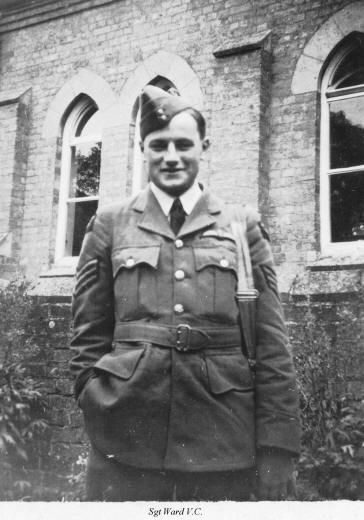 More can be found here: http://www.birkenheadrsa.com/vc-james-ward.htmlhttp://www.victoriacross.org.uk/bbwardja.htmhttp://en.wikipedia.org/wiki/James_Allen_Ward
My 'Waiting for Clod' thread: http://tinyurl.com/bqxc9eeAlways take sides. Neutrality helps the oppressor, never the victim. Silence encourages the tormentor, never the tormented.Elie Wiesel. Romanian born Jewish writer, professor, political activist, Nobel Laureate, Holocaust survivor. 1928 - 2016. Indeed the safest road to Hell is the gradual one - the gentle slope, soft underfoot, without sudden turnings, without milestones, without signposts. C.S. Lewis, 1898 - 1963.
|
|
#3131488 - 11/05/10 05:41 PM
 Re: While we're waiting for BoB SoW: WWII BBC RAF Broadcasts
[Re: RedToo]
Re: While we're waiting for BoB SoW: WWII BBC RAF Broadcasts
[Re: RedToo]
|
Joined: Nov 2005
Posts: 3,070
RedToo

Senior Member
|

Senior Member

Joined: Nov 2005
Posts: 3,070
Bolton UK
|
Part 86. 12. Havoc Stalks Hun Fighter command pilots in American-built Havoc aircraft paid visits to German-occupied aerodromes in northern France during the night. (Air Ministry Bulletin.) First of all, I should like to tell you not to measure the value of this night-fighter work over German aerodromes by the number of enemy aircraft known to have been destroyed. This is considerable, but I know positively that our mere presence over the enemy's bases has caused the loss of German bombers without even a shot being fired at them. Moreover, our presence upsets the Luftwaffe bomber organisation, throws their plans out of gear in many ways, and has a very big effect on the morale of the bomber crews. Night-fighter pilots chosen for this work are generally of a different type to the ordinary fighter pilot. They must like night-fighting to begin with, which is not everybody's meat. They must also have the technique for blind flying, and when it comes to fighting, must use their own initiative and judgment, since they are cut off from all communications with their base and are left as free lances entirely to their own resources. Personally I love it. Once up, setting a course in the dark for enemy-occupied country, one gets a tremendous feeling of detachment from the world. And when the enemy's air base is reached there is no thrill�even in big-game shooting �quite the same. On goes the flare-path, a bomber comes low�making a circuit of the landing field�lights on and throttle shut. A mile or two away, in our stalking Havoc, we feel our hearts dance. The throttle is banged open, the stick thrust forward, and the Havoc is tearing down in an irresistible rush. One short burst from the guns is usually sufficient. The bomber's glide turns to a dive�the last dive it is likely to make. Whether you get the Hun or miss him, he frequently piles up on the ground through making his landing in fright. My own successes stand out clearly in my mind. There was one night over France when I got an He. 111 for sure, and a Ju. 88 as a probable. It was the night of the last big raid on London, and the Huns were streaming back to their bases in swarms. I got a crack at the Ju. as, with navigation lights on, it came down to land. The bullets appeared to enter the starboard engine and fuselage of the bomber. My onward rush carried us, over the Ju., some ten feet above it, and as we passed my rear gunner poured a longish burst into the port engine. The bomber went into an almost vertical dive. She was only 800 feet up, and it is practically impossible that the pilot could have pulled out of the dive, apart from the fact that both his engines were damaged. But we only claimed the Ju. as a probable. After this, all the aerodrome lights were turned off. We climbed away and the lights came on again. So we bombed the aerodrome, and large fires resulted. The aerodrome lights were again put out. But there were numerous bombers still trying to land. We came down to 1,000 feet again and met an He. 111. I opened fire close in. The bullets entered one engine and the fuselage. After a second burst smoke poured from both engines, and it went into a steep, side-slipping turn. As we passed beneath her, the gunner put in another burst. Then, one night near St. Leger, after we had bombed the aerodrome at Douai, we met a huge Focke-Wulf Condor, a four-engined transport. It had its navigation lights on, about to land. At only 50 yards range, I put a good burst into the transport's belly. It was all that was necessary. The Condor gave out an enormous flash of light, burst into flames and blew to bits. Burning debris flew past my aircraft on all sides. When the Condor exploded in front of us, the flash was so blinding and the force was so great that we all thought our own machine had exploded. My most recent thrill was a fortnight ago, when I got one enemy aircraft destroyed and damaged two others, over an aerodrome which I visited by chance. I happened to go that way, and was overjoyed to find myself there at the right moment. Only a few aircraft were operating that night from that vicinity, and I was able to have a crack at three of them. Extra info. about the pilot in the above account provided by mhuxt from the twin thread to this over at UBI: The pilot is Bertie Rex O'Bryen Hoare, of 23 Squadron. The date should have told me - the only Havoc Intruder squadron during the time of large raids on London was 23. He claimed a Ju 88 Probably Destroyed and an He 111 Destroyed at Le Bourget on 3/4 May 1941, and claimed damage to an unidentified four-engine aircraft, believed to have been an Fw 200, on 21/22 April 1941 at St. Leger airfield (actually while flying a Blenheim). Hoare was a most interesting character. A pre-war pilot, he flew throughout the conflict with one good and one glass eye, having had a duck crash through his windscreen in a flying accident in the 30s. Poor fellow was eventually lost after the war, flying a Mosquito to Singapore. He crash-landed on a small island during bad weather, and was badly injured. Rescuers eventually found him, but too late. Thanks mhuxt. 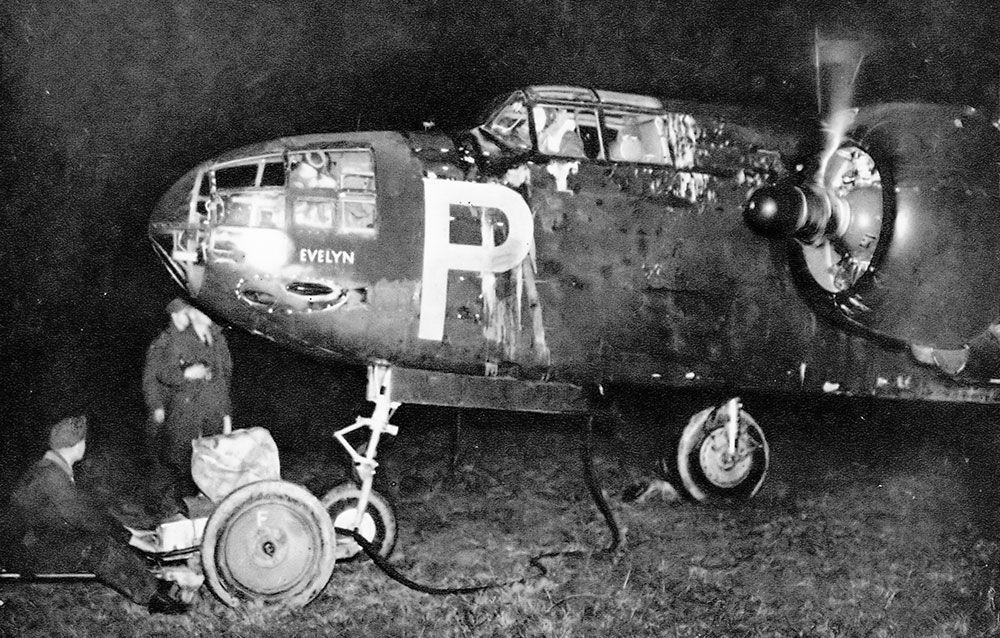 A Havoc night fighter-bomber makes ready to take off. 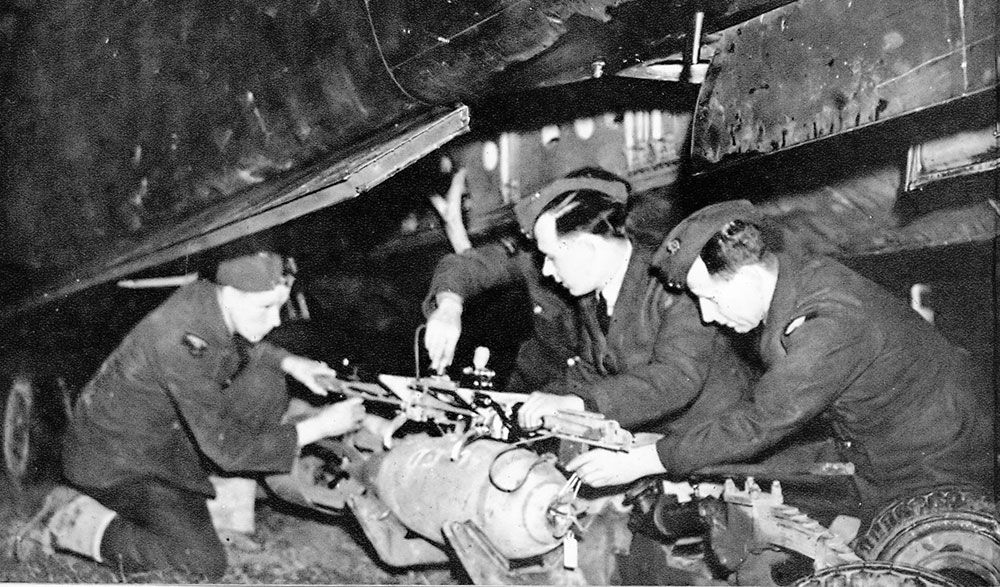 Bombing-up a Havoc night fighter-bomber.
Last edited by RedToo; 11/12/10 08:29 PM. Reason: Added extra info.
My 'Waiting for Clod' thread: http://tinyurl.com/bqxc9eeAlways take sides. Neutrality helps the oppressor, never the victim. Silence encourages the tormentor, never the tormented.Elie Wiesel. Romanian born Jewish writer, professor, political activist, Nobel Laureate, Holocaust survivor. 1928 - 2016. Indeed the safest road to Hell is the gradual one - the gentle slope, soft underfoot, without sudden turnings, without milestones, without signposts. C.S. Lewis, 1898 - 1963.
|
|
#3136176 - 11/12/10 08:18 PM
 Re: While we're waiting for BoB SoW: WWII BBC RAF Broadcasts
[Re: RedToo]
Re: While we're waiting for BoB SoW: WWII BBC RAF Broadcasts
[Re: RedToo]
|
Joined: Nov 2005
Posts: 3,070
RedToo

Senior Member
|

Senior Member

Joined: Nov 2005
Posts: 3,070
Bolton UK
|
Part 87. 13. We Shadowed the "Bismarck" The following signals have been exchanged in connection with the "Bismarck'' operations between the admiralty and the A.O.C.-in-C, Coastal Command. From Admiralty to the Air Officer Commanding-in-Chief, Coastal Command: Admiralty wish gratefully to acknowledge the part played by the reconnaissance of the forces under your command, which contributed in a large measure to the successful outcome of the recent operation. Message in reply to the above. To Admiralty from the A.O.C.-in-C, Coastal Command: Your message very much appreciated and has been repeated to all concerned. It was a great hunt and we are eager and ready for more. (Air Ministry Bulletin.) WE left our base at 3.30 in the morning, and we got to the area we had to search at 9.45. It was a hazy morning with poor visibility, and our job was to contact with �Bismarck," which had been lost since early Sunday morning. About an hour later we saw a dark shape ahead in the mist. We were flying low at the time. I and the second pilot were sitting side by side and we saw the ship at the same time. At first we could hardly believe our eyes. I believe we both shouted �There she is," or something of the sort. There was a forty-knot wind blowing and a heavy sea running, and she was digging her nose right in, throwing it white over her bows. At first, as we weren't sure that it was an enemy battleship, we had to make certain. So we altered course, went up to about 1,500 feet into a cloud, and circled. We thought we were near the stern of her when the cloud ended, and there we were, right above her. The first we knew of it was a couple of puffs of smoke just outside the cockpit window, and a devil of a lot of noise. And then we were surrounded by dark brownish black smoke as she pooped off at us with everything she'd got. She'd only been supposed to have eight anti-aircraft guns, but fire was coming from more than eight places�in fact, she looked just one big flash. The explosions threw the flying-boat about, and we could hear bits of shrapnel hit the hull. Luckily only a few penetrated. My first thought was that they were going to get us before we'd sent the signal off, so I grabbed a bit of paper and wrote out the message and gave it to the wireless operator. At the same time the second pilot took control, and took avoiding action. I should say that as soon as the �Bismarck �saw us she'd taken avoiding action too, by turning at right angles, heeling over and pitching in the heavy sea. When we'd got away a bit we cruised round while we inspected our damage. The rigger and I went over the aircraft, taking up floor-boards and thoroughly inspecting the hull. There were about half a dozen holes, and the rigger stopped them up with rubber plugs. We also kept an eye on the petrol gauges, because if they were going down too fast, that meant the tanks were holed and we wouldn't stand much chance of getting home. However, they were all right, and we went back to shadow �Bismarck." Then we met another Catalina. She'd been searching an area north of us, when she intercepted our signals and closed. On the way she'd seen a naval force, also coming towards us at full pelt through the heavy seas. They were part of our pursuing Fleet. When we saw this Catalina we knew she was shadowing the ship from signals we'd intercepted and because she was going round in big circles. So I formated on him and went close alongside. I could see the pilot through the cockpit window and he pointed in the direction the �Bismarck" was going. He had come to relieve us: it was just as well, for we couldn't stay much longer, because the holes in our hull made it essential to land in daylight. So we left the other Catalina to shadow �Bismarck." You all know what happened after that. We landed just after half-past nine at night, after flying for over eighteen hours. But one of our Catalinas during this operation set up a new record for Coastal Command of twenty-seven hours on continuous reconnaissance.  Consolidated Catalina Flying Boat. Two Pratt and Whitney twin Wasp engines each developing 1,200 h.p. Range over 4,000 miles. The water looks almost as good as Oleg�s �  Bombing-up is a skilled and delicate process. More info: one of the crew of the Catalina was an American. Thanks to mhuxt for pointing me towards this. Ensign Leonard B. "Tuck" Smith was acting as co-pilot to Flying Officer Dennis Briggs on the Catalina that found the Bismarck. He was one of a group of American pilots sent over to the UK to help train RAF pilots on the Catalina. This was well before America entered the war. The pic below shows Flying Officer Dennis Briggs at the microphone - perhaps recording the BBC talk above. 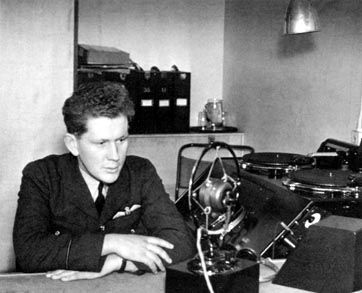 Flying Officer Dennis Briggs, pilot of the Consolidated PBY-5 (Catalina) flying boat that re-discovered the Bismarck on 26 May.
Last edited by RedToo; 11/13/10 07:24 PM. Reason: More info.
My 'Waiting for Clod' thread: http://tinyurl.com/bqxc9eeAlways take sides. Neutrality helps the oppressor, never the victim. Silence encourages the tormentor, never the tormented.Elie Wiesel. Romanian born Jewish writer, professor, political activist, Nobel Laureate, Holocaust survivor. 1928 - 2016. Indeed the safest road to Hell is the gradual one - the gentle slope, soft underfoot, without sudden turnings, without milestones, without signposts. C.S. Lewis, 1898 - 1963.
|
|
#3140748 - 11/19/10 08:42 PM
 Re: While we're waiting for BoB SoW: WWII BBC RAF Broadcasts
[Re: RedToo]
Re: While we're waiting for BoB SoW: WWII BBC RAF Broadcasts
[Re: RedToo]
|
Joined: Nov 2005
Posts: 3,070
RedToo

Senior Member
|

Senior Member

Joined: Nov 2005
Posts: 3,070
Bolton UK
|
Part 88. 14. W. A. A. F. in Air Raids It is now commonplace to hear that in German attacks on R.A.F. aerodromes the W.A.A.F. personnel displayed great courage and coolness. . . . (Air Ministry Bulletin.) ONE cool, sunny morning I was talking to my senior sergeant (flight-sergeant) in the guard-room about the ordinary routine of the day, when the station broadcast ordered one squadron "to come to readiness." I told her that I might as well stay where I was for the time being, and go with her down one of the airwomen's trenches nearby should there prove to be a raid. But as the minutes passed and there were no further announcements, I started off towards my office in the station headquarters building. As I entered headquarters the sirens wailed and we were told to go to the trenches. A few seconds later we heard one squadron roar into the air, then another, then still another, and finally the civilian air-raid warnings sounded in the surrounding country. We laughed and chatted on our way to the trenches, as this was no unusual occurrence. We had hardly settled down when the noise of the patrol�ling aircraft overhead changed from a constant buzz to the zoom and groan of aircraft in a dog-fight. Then aircraft and machine-guns barked and sputtered, while plane after plane dove down, with a head-splitting, nerve-shattering roar. I had no idea that so much could happen so quickly and remember thinking: " I suppose one feels like this in a bad earthquake." Then there was a lull, broken only by the sound of our aircraft returning to refuel and re-arm. A moment later a messenger arrived to report that a trench had been hit on the edge of the aerodrome. The padre and another officer followed the messenger to the scene of the disaster, and I thought I'd better go and see if the airwomen were all right in their trenches. All was now deathly silent. I climbed through debris and round craters back towards the W.A.A.F. guard-room. As I drew nearer, there was a strong smell of escaping gas. The mains had been hit. Another bomb had fallen on the airwomen's trench near the guard-room, burying the women who were sheltering inside. After a while I returned to headquarters to report to the Station Commander, and was told that the W.A.A.F. Officers' Mess could not be used as there was a delayed-action bomb in the garden. After some food, I went over to the W.A.A.F. cookhouse to see how things were going. The airwomen's Mess was the only one which had not been damaged by the raid, and I could see that they would have to do all the cooking for the station for a bit. On the way there I saw something like a white pillow lying on the ground. As I approached to pick it up a voice said out of the darkness, "I shouldn't touch that if I was you, Miss, it's marking a delayed-action bomb." I thanked him very much, and trying hard not to look as though I was walking any quicker than I had been previously, I proceeded on my way to the cookhouse. The airwomen were cooking virtually in the dark. But to their eternal credit they were producing delicious smelling sausages and mash to an endless stream of men going past a service hatch. The next afternoon, as I was returning to the aerodrome from my "billet-hunting " expedition with another W.A.A.F. officer, we were caught in a second attack. Our choices of action were few. There was no time to get to a trench, so we hurriedly put on our tin hats and ran into a nearby wood. As we did so, all the preliminary noises of the previous day began again. The edge of the wood was near a cross-roads, and as we ducked under the trees the police "bell-shelter " opened and a policeman shouted, " You'd better come in here." We did not hesitate, but scrambled in quickly. It was a tight squeeze, but it became much worse when a bus-driver, who also wanted admission, banged on the door. Somehow�I still don't know how�we got him inside. We waited till the noise had died down before we emerged, weighing, I am sure, much less. By the time we reached the aerodrome a fierce fire was raging in one quarter, but this time all my airwomen had escaped injury. This story covers a period of almost forty-eight hours. It started with a clean, tidy station, efficient to perfection; it ends with buildings destroyed, telephone lines blown up, and the aerodrome itself cratered. But not for one second did this station cease to be operational: it never failed to keep open its communications, and it still got fed! For their heroic work three of my airwomen were later awarded Military Medals. 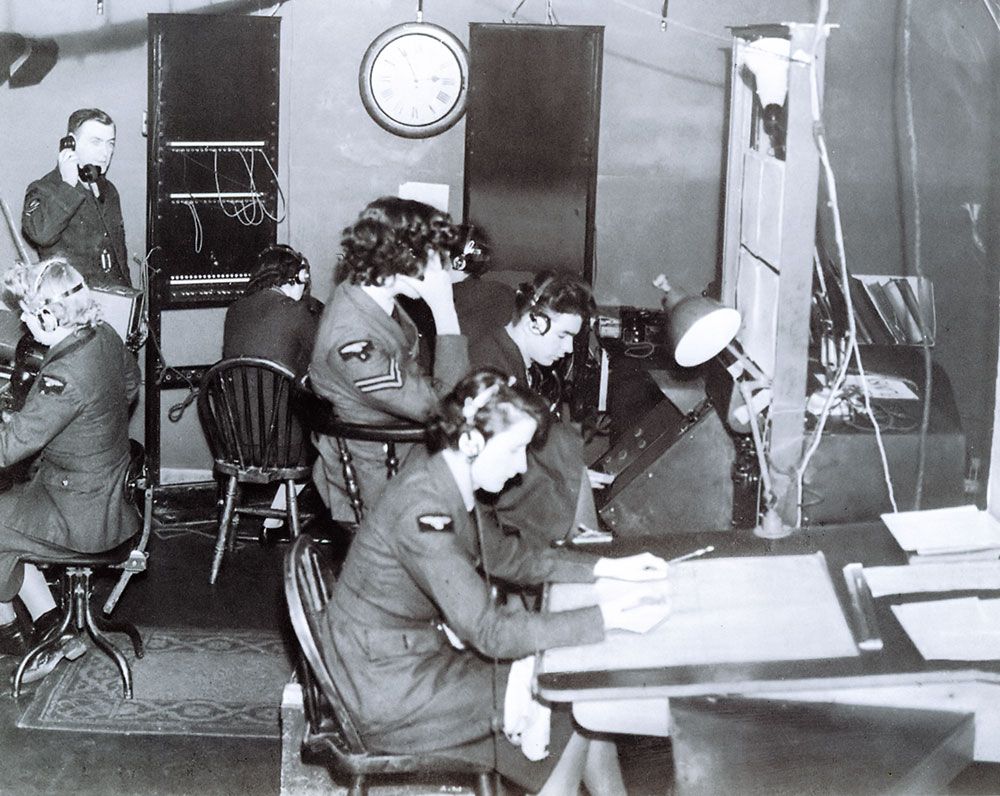 WAAFs and airmen in the front line at the Chain Home Station above Ventnor on the Isle of Wight. 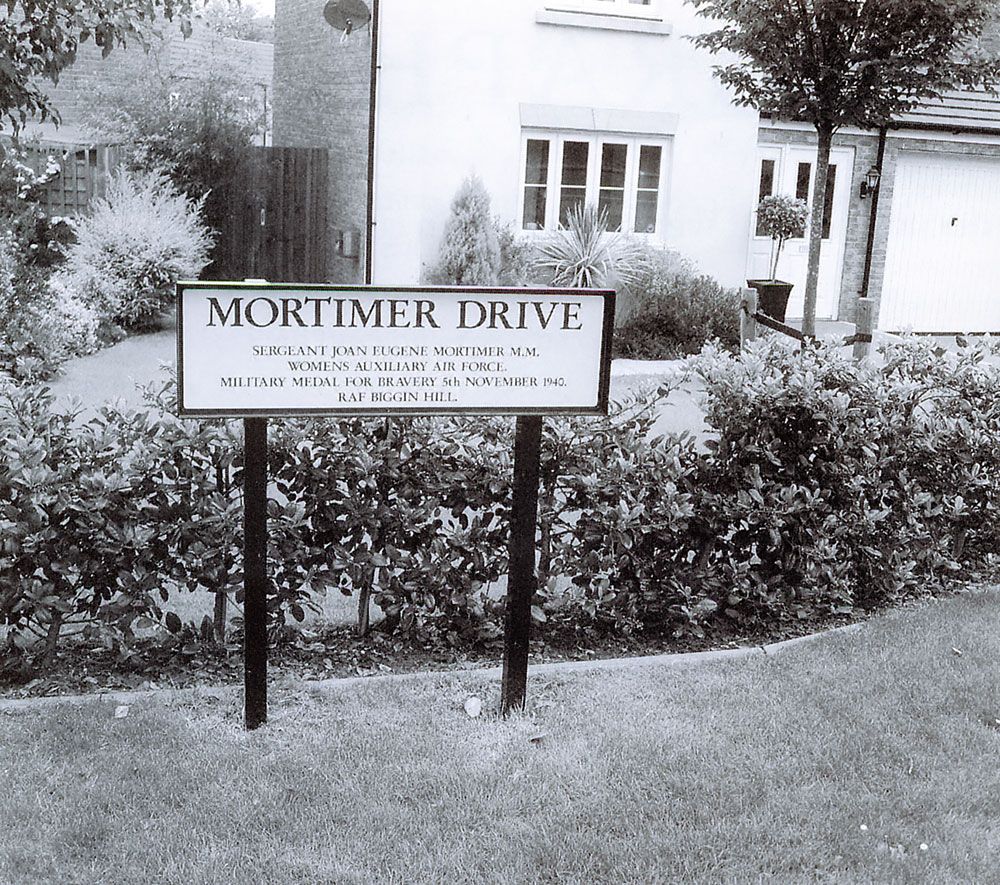 Across the road from Biggin Hill airfield, in the area that formerly housed the RAF married quarters, are roads named after the three WAAFs who won the Military Medal in the Battle of Britain. The date is that on which the award was gazetted.
My 'Waiting for Clod' thread: http://tinyurl.com/bqxc9eeAlways take sides. Neutrality helps the oppressor, never the victim. Silence encourages the tormentor, never the tormented.Elie Wiesel. Romanian born Jewish writer, professor, political activist, Nobel Laureate, Holocaust survivor. 1928 - 2016. Indeed the safest road to Hell is the gradual one - the gentle slope, soft underfoot, without sudden turnings, without milestones, without signposts. C.S. Lewis, 1898 - 1963.
|
|
#3144945 - 11/26/10 08:30 PM
 Re: While we're waiting for BoB SoW: WWII BBC RAF Broadcasts
[Re: RedToo]
Re: While we're waiting for BoB SoW: WWII BBC RAF Broadcasts
[Re: RedToo]
|
Joined: Nov 2005
Posts: 3,070
RedToo

Senior Member
|

Senior Member

Joined: Nov 2005
Posts: 3,070
Bolton UK
|
Part 89. 15. Dog-fights Over England The king has been graciously pleased to approve the following awards in recognition of gallantry displayed in flying operations against the enemy: Bar to the Distinguished Flying Cross. Acting Wing Commander --------, D.S.O., D.F.C. This fearless pilot has recently added a further four enemy aircraft to his previous successes; in addition, he has probably destroyed another four and damaged five hostile aircraft. . . . (Air Ministry Bulletin.) I'D like to tell you something about the boys in my squadron. They're grand lads, every one of them. About 75 per cent, are Canadians and many of them came over to this country a year or two before the war to join the R.A.F. Several worked their way across, at least two of them on cattle-boats, and they all came here to do what they'd wanted to do since they were youngsters�to fly. Since the war started they've shown that they can fight as well as they fly, and between them they've already won six of the nine D.F.C.s which have been awarded to the squadron. One holder of the D.F.C. is from Victoria, British Columbia. Another, who has won a bar to his D.F.C., comes from Calgary, Alberta. Others come from Toronto, Vancouver and Saskatoon. There's never been a happier or more determined crowd of fighter pilots, and, as an Englishman, I'm very proud to have the honour of leading them. I shan't soon forget the first time the squadron was in action under my leadership. It was on August 30th, and I detailed the pilot from Calgary to take his section of three Hurricanes up to keep thirty Me. 110's busy. "O.K., O.K.," he said with obvious relish, and away he streaked to deal with that vastly superior number of enemy fighters. When I saw him afterwards, his most vivid impression was of one German aircraft which he had sent crashing into a green-house. But perhaps I'd better start at the beginning of that particular day's battle. Thirteen of the squadron were on patrol near London. We were looking for the Germans whom we knew were about in large formations. Soon we spotted one large formation, and it was rather an awe-inspiring sight�particularly to anyone who hadn't previously been in action. I counted fourteen blocks of six aircraft�all bombers�with thirty Me. 110 fighters behind and above. So that altogether there were more than 100 enemy aircraft to deal with. Four of the boys had gone off to check up on some unidentified aircraft which had appeared shortly before we sighted the big formation, and they weren't back in time to join in the fun. That left nine of us to tackle the big enemy formation. I sent three Hurricanes up to keep the no's busy, while the remaining six of us tackled the bombers. They were flying at 15,000 feet with the middle of the formation roughly over Enfield, heading east. When we first sighted them they looked just like a vast swarm of bees. With the sun at our backs and the advantage of greater height, conditions were ideal for a surprise attack and as soon as we were all in position we went straight down on to them. We didn't adopt any set rule in attacking them�we just worked on the axiom that the shortest distance between two points is a straight line. I led the attack and went for what I think was the third block of six from the back. And did those Huns break up ! In a few seconds there was utter confusion. They broke up all over the sky. As I went through, the section I aimed at fanned out. I can't give you an exact sequence of events, but I know that the Canadian pilot who followed immediately behind took the one that broke away to the left, while I took the one that broke away to the right. The third man in our line went straight through and gave the rear gunner of a Hun in one of the middle blocks an awful shock. Then the other boys followed on and things really began to get moving. Now there's one curious thing about this air fighting. One minute you see hundreds of aeroplanes in the sky, and the next minute there's nothing. All you can do is to look through your sights at your particular target�and look in your mirror too, if you are sensible, for any Messerschmitts which might be trying to get on to your tail. Well, that particular battle lasted about five or ten minutes, and then, quite suddenly, the sky was clear of aircraft. We hadn't shot them all down, of course; they hadn't waited for that, but had made off home in all directions at high speed. When we got down we totted up the score. We had destroyed twelve enemy aircraft with our nine Hurricanes. And when we examined our aircraft there wasn't a single bullet-hole in any of them! One pilot had sent a Hun bomber crashing into a green�house. Another bomber had gone headlong into a field filled with derelict motor-cars. It hit one of the cars, turned over and caught fire. Another of our chaps had seen a twin-engined job of sorts go into a reservoir near Enfield. Yet another pilot saw his victim go down with his engine flat out. The plane dived into a field and disintegrated into little pieces. Incidentally, that particular pilot brought down three Huns that day. Apart from our bag of twelve, there were a number of others which were badly shot up and probably never got home, like one which went staggering out over Southend with one engine out of action. Another day we like to remember�what fighter squadron who was in the show doesn't!�was Sunday, September 15th. when 185 enemy aircraft were destroyed. Our squadron led a wing of four or five squadrons in two sorties that day, and we emerged with 52 victims for the Wing, twelve of them falling to our squadron. On the first show that day we were at 20,000 feet, and ran into a large block of Ju. 88's and Do. 17's�about forty in all and without a single fighter to escort them. This time, for a change, we outnumbered the Hun, and believe me, no more than eight got home from that party. At one time you could see planes going down on fire all over the place, and the sky seemed full of parachutes. It was sudden death that morning, for our fighters shot them to blazes. One unfortunate German rear-gunner baled out of the Dornier 17 I attacked, but his parachute caught on the tail. There he was, swinging helplessly, with the aircraft swooping and diving and staggering all over the sky, being pulled about by the man hanging by his parachute from the tail. That bomber went crashing into the Thames Estuary, with the swinging gunner still there. Just about the same time one of my boys saw a similar thing in another Dornier, though this time the gunner who tried to bale out had his parachute caught before it opened. It caught in the hood, and our pilot saw the other two members of the crew crawl up and struggle to set him free. He was swinging from his packed parachute until they pushed him clear. Then they jumped off after him, and their plane went into the water with a terrific smack. I've always thought it was a pretty stout effort on the part of those two Huns who refused to leave their pal fastened to the doomed aircraft. The other day I led two of the latest recruits to the squadron on a search for a Ju. 88 off the East Coast. We found it fifty or sixty miles out to sea, and I led an attack from below. Suddenly the raider jettisoned his bombs and two of us had to duck out of the way. We know some of the German tricks to try to get rid of our fighters, and at first I thought he was throwing out some new kind of secret weapon to bump us off. Then I realised he'd let them go to help his speed. I kept with him and told the other two boys to go in and have a crack. Their shooting was amazingly accurate, and for the first time I saw bullets other than my own going into the fuselage of an enemy bomber. You know how the lights flash on a penny-in-the-slot bagatelle table ? As the little ball goes through the various pins different lights flash. Well, that's how the bullets from one of these Hurricanes went in. I watched them cracking in. The bomber pilot tried to get away and made for a cloud about the size of a man's hand. He went in, while one of my boys cruised around on top and the other waited underneath. Either the pilot of that Ju. 88 was a damned fool or he just couldn't help it, but he came flying nicely out of the cloud at the other end on a straight course. The boy on top nipped down on him like a greyhound after a hare. The boy below went up�it was almost like watching an event at a coursing meeting. When they had finished their ammunition those two Canadians left the bomber in a pretty bad state, and all I had to do was to finish him off. 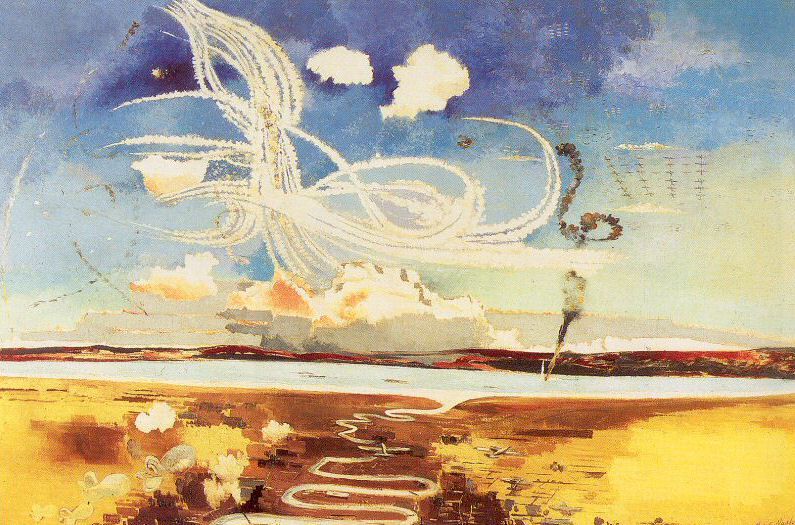 The Battle of Britain by Paul Nash. Painted in 1941. http://en.wikipedia.org/wiki/Paul_Nash_%28artist%29
My 'Waiting for Clod' thread: http://tinyurl.com/bqxc9eeAlways take sides. Neutrality helps the oppressor, never the victim. Silence encourages the tormentor, never the tormented.Elie Wiesel. Romanian born Jewish writer, professor, political activist, Nobel Laureate, Holocaust survivor. 1928 - 2016. Indeed the safest road to Hell is the gradual one - the gentle slope, soft underfoot, without sudden turnings, without milestones, without signposts. C.S. Lewis, 1898 - 1963.
|
|
#3149298 - 12/03/10 09:05 PM
 Re: While we're waiting for BoB SoW: WWII BBC RAF Broadcasts
[Re: RedToo]
Re: While we're waiting for BoB SoW: WWII BBC RAF Broadcasts
[Re: RedToo]
|
Joined: Nov 2005
Posts: 3,070
RedToo

Senior Member
|

Senior Member

Joined: Nov 2005
Posts: 3,070
Bolton UK
|
Part 90. 16. Low-level Raid on Nantes The people of Nantes heard a message of hope and ultimate deliverance for France on Sunday night when a force of Beauforts of the coastal command flew low over the city as dusk fell. The town is surrounded by German troops and is where the 50 hostages are in prison. Our aircraft dropped a load of high-explosive and incendiary bombs on the docks area and also distributed thousands of leaflets to the citizens of Nantes. (Air Ministry Bulletin.) The flight over the sea to France was thrilling. We flew in formation over the waves at about too feet. The seas were running high and we passed over trawlers which were literally standing on their tails. So it was a great relief when we arrived. We were so low when we reached the French coast that I had to pull up sharply to avoid the sand-dunes. There was still some day light and we went along at what we call "nought feet." Every time we came to a clump of trees we leap-frogged over them and then went down almost to the ground again. We went over scores of little villages and we could see the people open their doors and rush to wave. It grew darker as we went farther inland, and then began the most surprising experience of all. It was really remark able�as though the whole of that part of France were turning out to welcome us. Every village we went over became a blaze of light. People threw open their doors and came out to watch us skim their chimney-pots. In other places whole hamlets would suddenly light up, as if the people had torn the blackout down when they heard us coming and had waited until we were overhead to switch on the lights. Sometimes people switched their lights on and off until we had gone over. I remember one house with a courtyard fully lit up. I saw a woman come out of the house, look up at us, wave, and then go back. She switched off the outside lights and then I saw a yellow light from inside stream out as she opened the door. Our targets were the docks on the banks of the River Loire. The moon was up now, but it was only shining fitfully through a cloud. Still, we could see the river easily enough, and the other Beauforts formated on me until we separated near the target as we had planned. It was a good moment as we ran up over the docks of Nantes outside the town. The squadron had thrown every effort into this raid. It was the climax as we climbed 200 or 300 feet above the water and let the bombs go in a shallow dive. I followed my bombs down until I was just above the ground again, and then I beat it, flat out, across the roof-tops of Nantes. The whole city was laid out below us, church spires gleaming in the moonlight, streets and houses clearly out lined. It looked like a city of the dead for the first minute. Then I began to see white pin-points on the ground, and one by one lights appeared as we raced over the chimney pots, our engines flat out and creating a terrific roar. We were at top speed, but even so we could see doors opening and people coming out. I felt that we had brought some comfort to the people of Nantes and that they had come out to wave and wish us good luck. 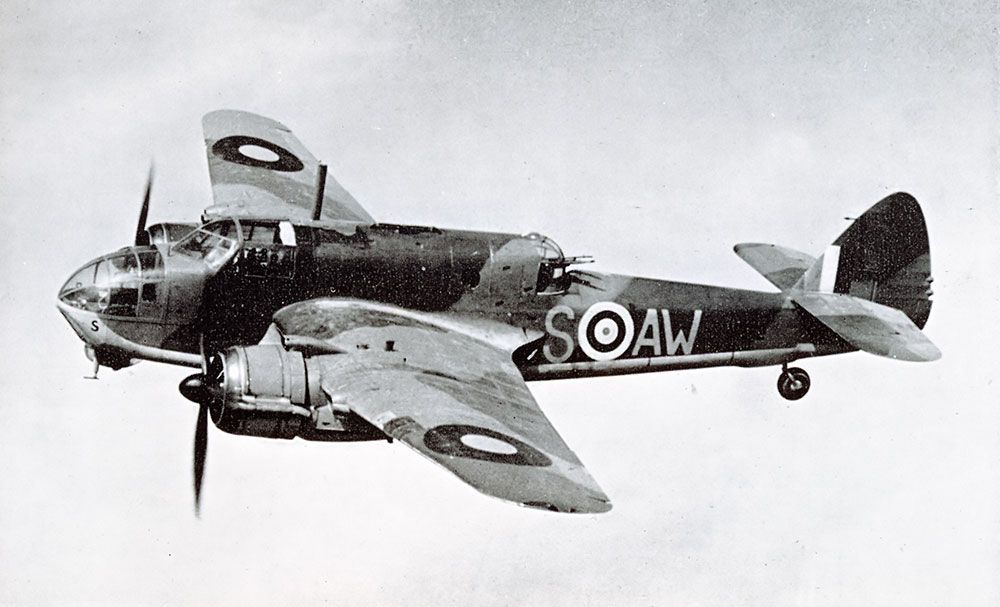 A Bristol Beaufort.
My 'Waiting for Clod' thread: http://tinyurl.com/bqxc9eeAlways take sides. Neutrality helps the oppressor, never the victim. Silence encourages the tormentor, never the tormented.Elie Wiesel. Romanian born Jewish writer, professor, political activist, Nobel Laureate, Holocaust survivor. 1928 - 2016. Indeed the safest road to Hell is the gradual one - the gentle slope, soft underfoot, without sudden turnings, without milestones, without signposts. C.S. Lewis, 1898 - 1963.
|
|
#3154647 - 12/10/10 09:27 PM
 Re: While we're waiting for BoB SoW: WWII BBC RAF Broadcasts
[Re: RedToo]
Re: While we're waiting for BoB SoW: WWII BBC RAF Broadcasts
[Re: RedToo]
|
Joined: Nov 2005
Posts: 3,070
RedToo

Senior Member
|

Senior Member

Joined: Nov 2005
Posts: 3,070
Bolton UK
|
Part 91. 17. Parachute Troops Before the aircraft had disappeared into cloud again, they had landed, unharnessed their parachutes, and were silently preparing to attack a remote and vital enemy objective. (Air Ministry Bulletin.) IT was the Russians who first translated the idea of the parachute�an idea first recorded by Leonardo da Vinci� into a means of war-like attack. The first parachute descent was 150 years ago, the first jump from an aeroplane thirty years ago, but it was not till about ten years ago that we began to see those pictures from Moscow�a thousand parachutes dappling a cloudless sky like spots on a silk handkerchief. Reactions were various but the Germans alone methodically studied it, worked out their own rather different technique and adopted it for their young army. When they attacked Finland, the Russian parachute troops were almost a complete failure. When the Germans attacked Norway, they tried their new technique. In a few cases they achieved their object and many lessons were learnt. It was in Holland that the parachutists were first successful. Comparatively few were used � perhaps 2,000 in all�and the main attacks were on The Hague and Rotterdam. All over the country was a well-organised mass of fifth-columnists. Even so, the parachutists were not successful everywhere �certainly not at The Hague. But they showed the effect, both on civilian morale and on military organisation, of packets of armed men delivered by air far in advance of the main army. One of the principal roles of parachute troops was clearly shown in Holland. They were the advance guard of much larger air-borne forces carried in troop-carrier aircraft. They dropped round selected points and held these till the Ju. 52's arrived. The theory of the air-borne force of all arms�the real flying column�was demonstrated for the first time. And the Germans, at least, were satisfied, for since then they have worked feverishly at the creation of a large air-borne army, numbered not by battalions but by divisions, to be transported in troop-carrying aircraft and in gliders, and of this force the paratroops are only a small proportion. The proposed use of the German air-borne army is a matter of conjecture. If it is thrown against this country, its casualties will be terrific. But will they be greater than if the same troops were advancing across no-man's-land behind a barrage towards a trench line bristling with machine-guns ? Probably not, and such attacks were sometimes successful in Flanders. Perhaps this, then, will be Hitler's secret invasion weapon. I think we must prepare ourselves to make the most of this�the best opportunity we shall get of destroying a war-worshipping section of the enemy's forces that is particularly dear to their leaders. Perhaps I may seem to have spoken unduly of the work of our enemies in the new field of air-borne warfare. What about ours ? Some of you will have noticed on the arms of certain officers and men a very attractive badge with the white parachute between blue soaring wings. The recent small operation in Italy has shown the extent to which the joint work of the R.A.F. and the Army has developed this new art. I daresay that in the whole of Army Co-operation Command there is no better example of co-operation between the services than in the organisation and training of the Special Air Service troops that has been quietly taking place for some time. The Royal Air Force has had to produce the parachute equipment, the methods of dropping and training, and to teach the troops all their air technique. Meanwhile, the Army have had to study the special organisation for fighting on the ground, the weapons and tactical training of the paratroops. Starting with the men themselves, they must be picked specimens, keen and determined and intelligent. It's going to cost a packet to get them on to the job, so when they get there, each of them must give the best possible account of himself. So, your parachutist is not the ape-faced all-in wrestler with a cauliflower ear, but a daring and clever man who feels that the only way to get the Germans down is to take the offensive, and who wants to do it as soon as possible. He must be physically very fit. The effect of reaching the ground on a parachute is about the same as jumping from a 10-foot wall, the height of an average ceiling. And if there's some wind and the parachute is drifting and swinging a bit, it's as if he were jumping on to the deck of a ship that is steaming full speed and rolling and pitching as well, with its deck covered with fences and hedges and trees as well as fields. Pretty exciting! The actual jump from the aircraft is specially important. The machine may be travelling over the ground at a couple of miles a minute. So, unless the men pop out of it very quickly, you can imagine that they'll land a long way apart from each other, and some will not be in the right place at all. Jumping in quick succession means careful drill. The job of flying the troops into the exact position for dropping is a Royal Air Force responsibility, as well as the whole organisation of the air side of an operation. Skilful piloting and accurate judgment are needed, and this is what makes an air-borne attack the perfect example of co-operation between airmen and soldiers. Our men, of course, always wear uniform. They are normal soldiers as much as the cavalry of the last generation, but they have special boots and helmets designed to give protection while landing, and their outer overalls, worn out�side everything but their parachute harness, ensures that none of their equipment can catch in any part of the plane as they jump. Their weapons also are specially selected according to the job they have to do. Often they must fight rapidly at short range like gangsters; sometimes silently hand to hand. . . . Such troops offer a means of local attack on vital points� as it were of sticking a hypodermic into specially sensitive places in the enemy's anatomy. I was one of those who helped to prepare and organise the recent expedition to Italy, and I was later privileged to go out with it and occupy a front seat in the stalls throughout the performance. There could be no greater contrast than between the troops who took part in that and the Nazi paratroop thugs. They were, of course, a specially selected and trained force, expert in the particular work they had to do, carrying very special equip�ment and led by magnificent officers. Unfortunately, I may not give many interesting details of the attack that you would like to hear. That must come later. But I can say that the R.A.F. pilots and crews who carried the force did their job with characteristic thoroughness and accuracy. The flights were long, at night, a good deal over hostile territory, and for long periods in pretty bad weather, and the places they were navigating to were pin-points. But they just ran to schedule. The night of the show itself was one of the most beautiful you can imagine: full moon and glorious stars above patches of white cloud; the sea clear of mist, and the snow-capped ridges of the Apennines. I'd flown over that bit of coast years ago in a Moth on my way to Africa and I could easily recognise it in the moonlight. It was a lovely scene. We could recognise every feature and landmark as we came in, looking just like the landscape model we had used in planning the job and training the air crews. It was easy afterwards to see the parachutes on the ground and the figures of the troops moving together, and giving us a last flash of their torches as we passed overhead. It was a moment one will never forget; but even more I shall remember the efficiency and the wonderful spirit of the men we dropped, their bearing, and the way they got into the aircraft at the take-off, singing a song with special words of their own, not particularly suited to the B.B.C., the refrain of which was �Oh! We've a surprise for the Duce, the Duce ! " They certainly had, and perhaps not the last. 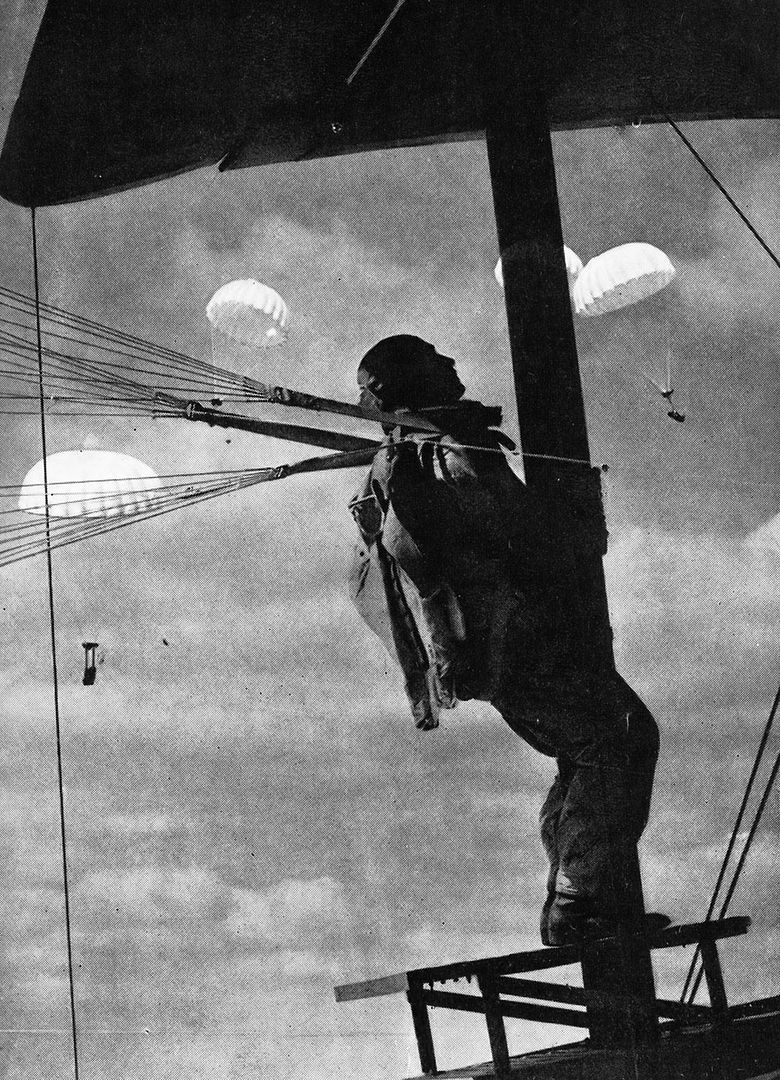 His first trip by parachute. This pupil, standing on a special platform, is learning how to jump with the parachute. He has pulled the ripcord of his parachute, which has opened. In a moment he will be dragged off the wing of the machine and will float safely to the ground. 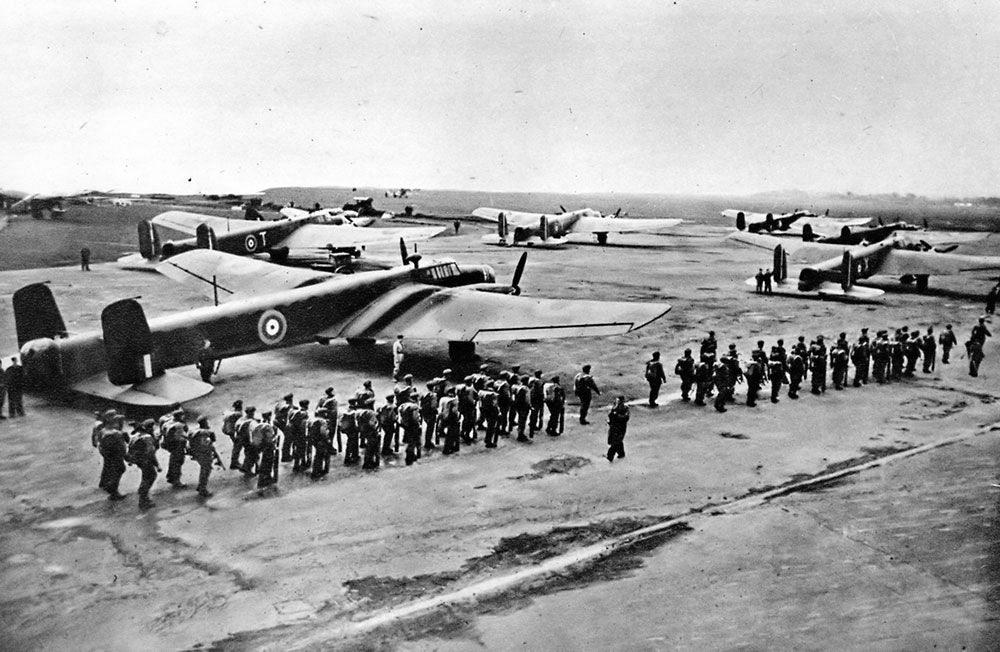 Parachute troops marching to emplane.
My 'Waiting for Clod' thread: http://tinyurl.com/bqxc9eeAlways take sides. Neutrality helps the oppressor, never the victim. Silence encourages the tormentor, never the tormented.Elie Wiesel. Romanian born Jewish writer, professor, political activist, Nobel Laureate, Holocaust survivor. 1928 - 2016. Indeed the safest road to Hell is the gradual one - the gentle slope, soft underfoot, without sudden turnings, without milestones, without signposts. C.S. Lewis, 1898 - 1963.
|
|
#3159424 - 12/17/10 08:39 PM
 Re: While we're waiting for BoB SoW: WWII BBC RAF Broadcasts
[Re: RedToo]
Re: While we're waiting for BoB SoW: WWII BBC RAF Broadcasts
[Re: RedToo]
|
Joined: Nov 2005
Posts: 3,070
RedToo

Senior Member
|

Senior Member

Joined: Nov 2005
Posts: 3,070
Bolton UK
|
Part 92. 18. Fortress Crosses the Atlantic A number of the very latest type of four-engined Flying Fortress bombers have just reached this country from the United States. . . . . . . Despite their vast size, the Flying Fortresses have beaten all records in their flight across the Atlantic. These machines will shortly be flying alongside British and other types of United States four-engined bombers in service with the Royal Air Force. (Ministry of Aircraft Production.) 1 CAN'T help feeling that there is not much of a story in this. The most remarkable thing about the whole flight was that it seemed so ordinary and uneventful. We just stepped into the Fortress on the other side one evening, flew her east all night, and landed in Britain soon after dawn the next day. It's true we had flown the Atlantic, but until we got close in to the British coast, we didn't even see the Atlantic. We were much too high. All we saw was the sky and the stars and the moon, clouds towering high above us here and there and a great floor of clouds beneath us. It was just about as exciting as a night flight from London to Paris in peacetime. I happened to be in Canada doing a course�and a very good time the Canadians gave us, too. When the course was finished I was told that I was to fly as navigator in one of the American bombers being sent to this country, but I wasn't told what aircraft it would be. In fact, it was only a few hours before we took off that I went down to the aerodrome and had a look at the Fortress which had just arrived. There were some Liberators about too, and they were all being sent here to take part in the war. I didn't actually get into the Fortress until just before we took off on the first stage of the journey from Montreal to Newfoundland. There wasn't much of a ceremony. A young lieutenant in the Canadian Army came down to wave us off and wish us luck. He seemed very impressed by the size of the Fortress�it really is a very large bomber indeed. And his last words to us were, �She�ll look nice over Berlin!� After we left him we settled ourselves in for the journey and I had a good look round the aircraft. My own �office," as navigator, was up in the nose. It was quite big enough to be called an office. It had a nice big table in it, a chair, plenty of lockers, and racks and instruments and a carpet on the floor. If I put my feet up to the table and leant back in the chair, I could just touch the opposite wall by stretching out my arm to its full length. And up in front a couple of machine guns stuck out, so that I could fight a bit of the war, if the need arose, almost without getting out of my office chair! There was a window behind me through which I could pass messages up to the two pilots. The flight engineer sat behind them, and through the door at his back you got into the part of the fuselage where the bombs are carried. Through that, there was a catwalk leading aft to the fairly large room which housed the wireless operator and the gunners. The whole thing was beautifully fitted out. The American Army fliers do themselves very well. They even have a sort of electric oven which is wheeled out of the hangar at the last minute, full of hot food, and plugged into the aircraft's electric circuit, to keep it hot. And behind the wireless operator there are two large urns with taps, one pouring out coffee, the other tea. But we weren't going far, so we contented ourselves with a few egg and bacon sandwiches and a few thermos flasks. We reached our intermediate aerodrome in time for lunch, and in time, too, to watch two other Flying Fortresses set off for Britain. I've never seen such a place for snow. It had been cleared from the aerodrome, but it lay ten feet deep alongside, and it was melting and trickling over the runway, so that the two Fortresses took off in great clouds of spray kicked up behind them. They took off splendidly, though, and headed east. We were held up for a couple of days by bad weather reports, so it was two evenings later, just as the sun was setting, that we, too, started out on the long flight to Britain. There was a slight check soon after we started, for the wireless seemed to falter, and we turned to put back. But it righted itself and we turned again to the east, climbing at once to 20,000 feet, and staying at that height all the way over. The journey was then quite uneventful. Once I strolled aft to see the wireless operator, but I found even that short walk took it out of me badly, and I was glad to get back to my own office and my oxygen supply I spent most of the time navigating by the stars, and that kept me quite busy. Occasionally I chatted with the pilots, and I ate the sand�wiches I had brought with me, and drank the tea from my flask. The bomber rode beautifully, with never a jolt. Far below us in the darkness was the cloud bank over the Atlantic. Sometimes we passed under a roof of cirrus cloud 5,000 feet or more above us. When the moon came up, it grew quite bright. It also grew extremely cold, and the temperature went down to about 45 degrees of frost, so that sometimes the windows were clouded over with hoar frost. And then my office, with the electric light shining on the table, the charts, the instruments, the rack of pencils, became a little room quite boxed away from the world, speeding steadily eastwards towards the war at 20,000 feet above the Atlantic. Dawn was breaking as we approached the shores of Britain, and we started to come down through about 15,000 feet of cloud. A little ice formed on the wings as we came down, but nothing to worry us. Now and then one of us shone an electric torch through the window to keep an eye on the ice. And then, in the thin torchlight, we could see the big wings of the Fortress stretching out into nothing, and the four engines turning steadily. We broke cloud at about 1,500 feet above the sea. It started to grow light quickly then, and soon we were above the British coast�we came out, actually, only five miles from the point at which we were aiming. The Group Captain of the aerodrome came out to meet us when we landed and took us in to a large and much-needed breakfast. The flight was over. Britain had another big bomber�just one more in the procession which is steadily moving eastwards now over the Atlantic. 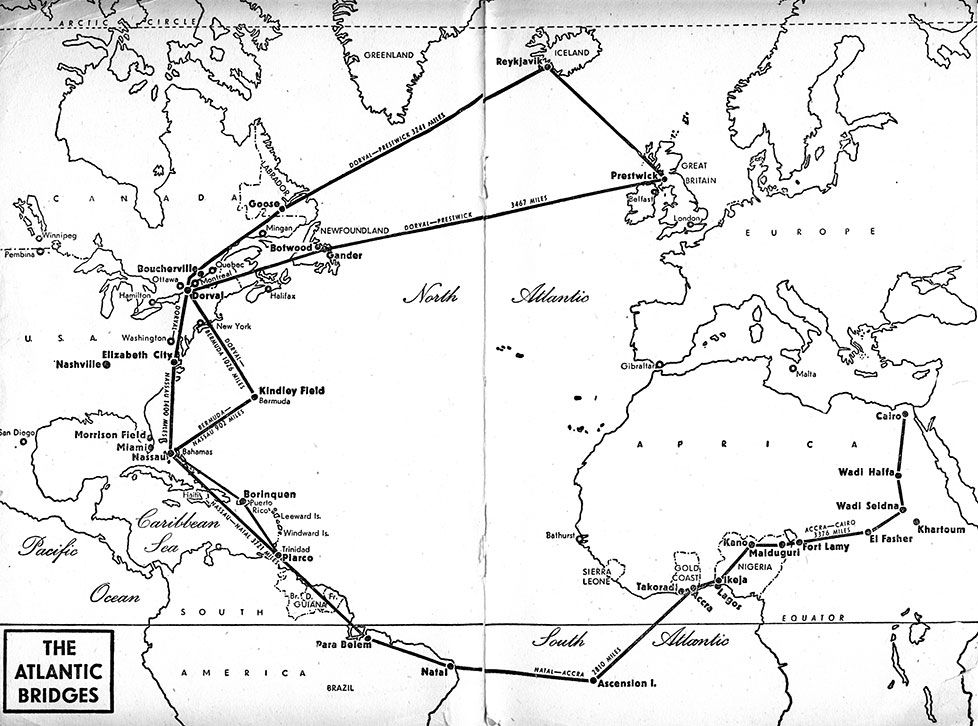 The Atlantic Bridges. 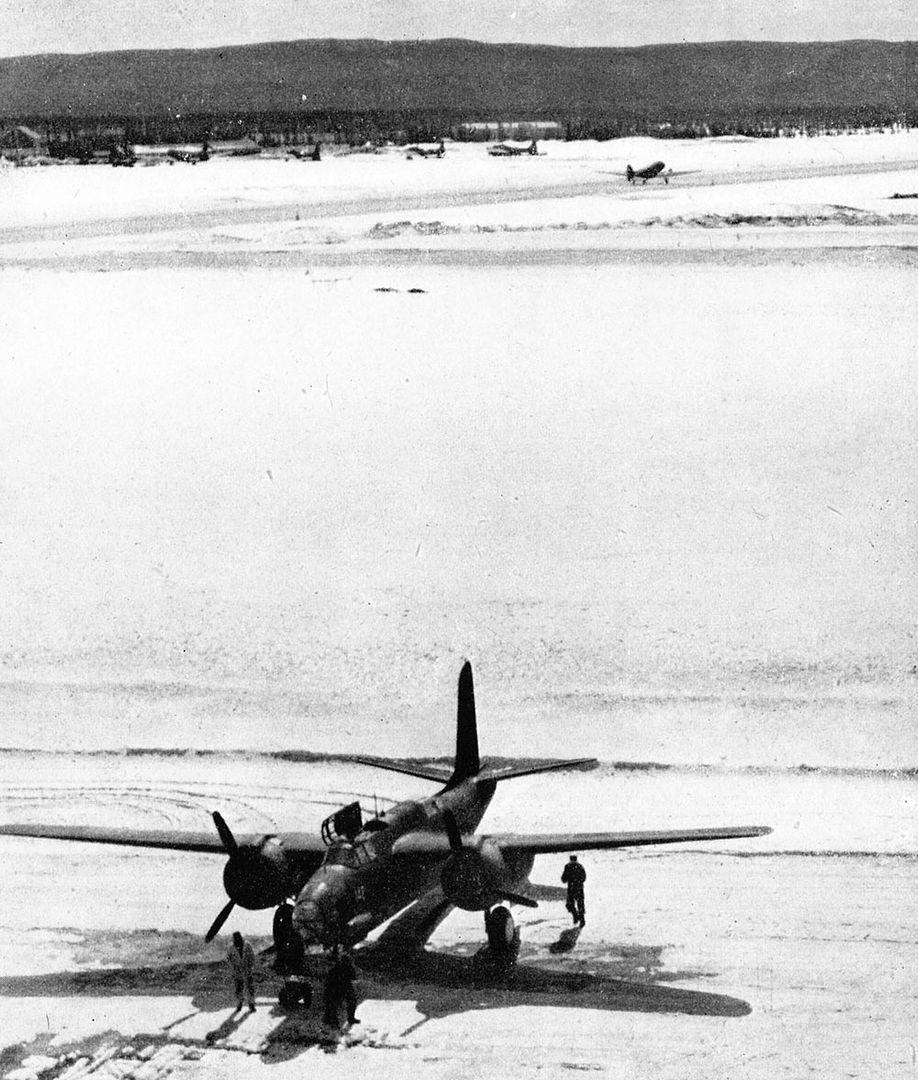 Goose Airfield. 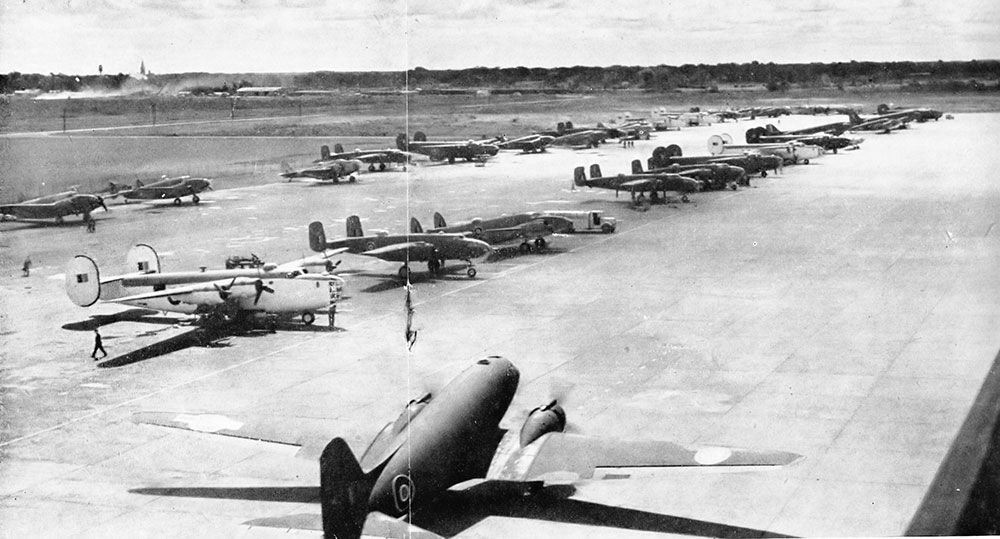 Dorval Airfield. 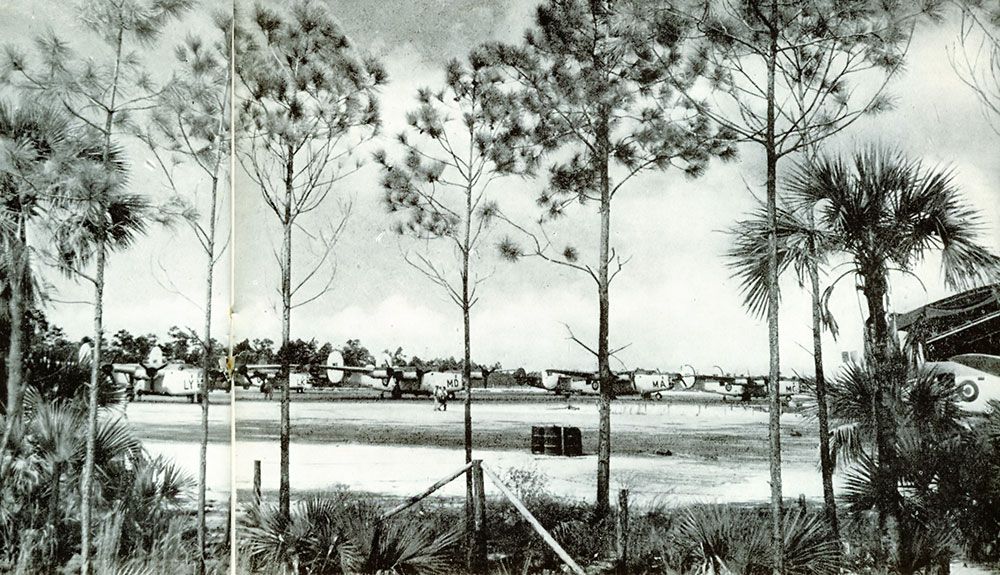 Windsor Airfield. 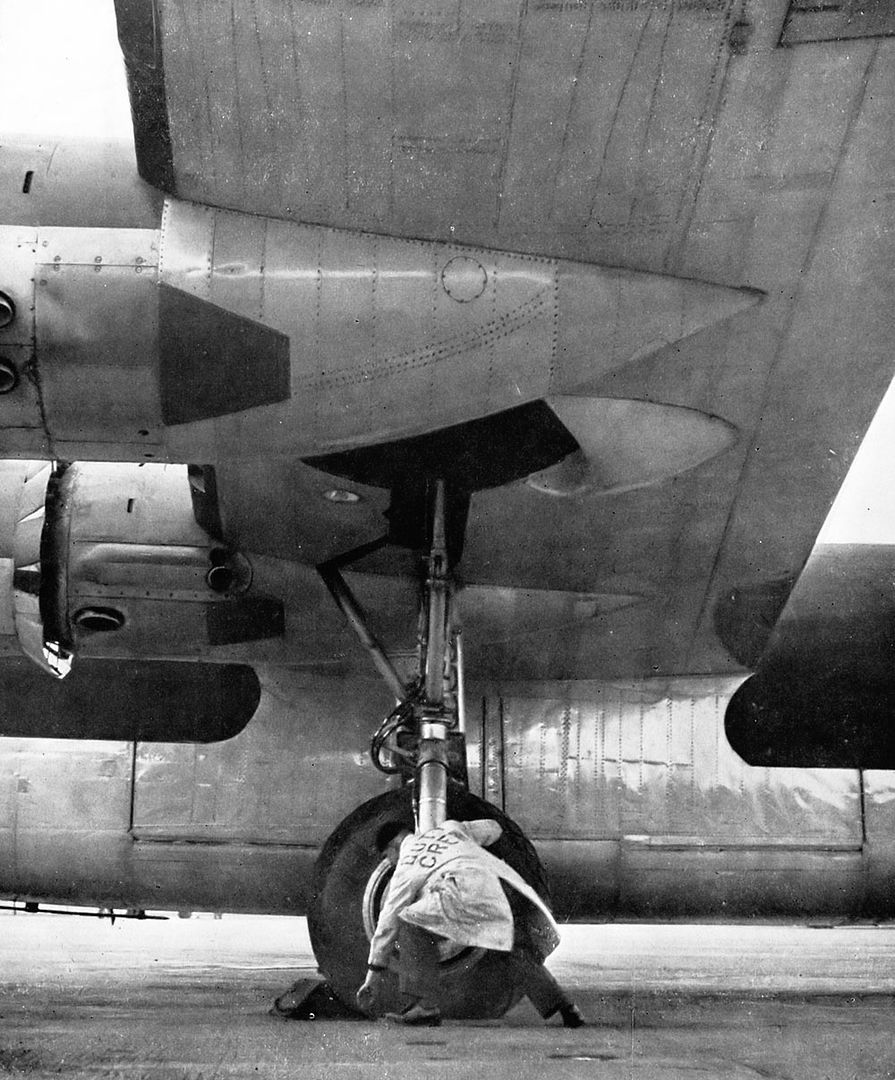 A Liberator arrives safely at Prestwick.
My 'Waiting for Clod' thread: http://tinyurl.com/bqxc9eeAlways take sides. Neutrality helps the oppressor, never the victim. Silence encourages the tormentor, never the tormented.Elie Wiesel. Romanian born Jewish writer, professor, political activist, Nobel Laureate, Holocaust survivor. 1928 - 2016. Indeed the safest road to Hell is the gradual one - the gentle slope, soft underfoot, without sudden turnings, without milestones, without signposts. C.S. Lewis, 1898 - 1963.
|
|
#3165538 - 12/25/10 08:10 PM
 Re: While we're waiting for BoB SoW: WWII BBC RAF Broadcasts
[Re: RedToo]
Re: While we're waiting for BoB SoW: WWII BBC RAF Broadcasts
[Re: RedToo]
|
Joined: Nov 2005
Posts: 3,070
RedToo

Senior Member
|

Senior Member

Joined: Nov 2005
Posts: 3,070
Bolton UK
|
Part 93. Sorry it's late - Christmas does tend to soak up ones time ... 19. Home on One Engine With great skill, Sergeant -------- flew his severely damaged aircraft back to this country, after dropping his bombs on an enemy objective, making a successful landing at an aerodrome, without injury to the crew. (Air Ministry Bulletin.) UNLIKE the Germans, who only have to cross the Channel to get to England, we have the North Sea to think of on our way to and from Germany. And there have, of course, been plenty of adventures over the North Sea in this way. I'll tell you now about one which happened to me and my crew recently. We had just made a successful night raid on the docks at Wilhelmshaven and were barely ten minutes away from the target when we ran into heavy anti-aircraft fire. It wasn't as bad as I have known it, but one of the shells hit the star board engine and soon after that the airscrew came away from the engine and flew off into space. I didn't actually see it go, and the first I knew that something was wrong was when the aircraft swerved to the right�fortunately not a very violent swerve�and at the same time I heard the navigator telling me what had happened. I looked down and there were sparks and flames shooting out of the engine cowling, and for a second or two I thought that it was all up with us. I gave the crew the order to stand by to abandon aircraft, and then it passed through my mind that we ought to be able to make a forced landing in Germany. My next thought was that, either way, we'd become prisoners of war, and I didn't like the idea of that at all. By now the crew were ready to bale out, and then I saw that the flames had disappeared. What put them out I don't know. The main thing is that they went out, and with the danger of fire over, there was a reasonable chance of getting back home. Anyhow, it was worth the gamble, and the crew were, like me, all in favour of having a shot at it. At the time we were 8,000 feet up, facing a strong head�wind which would soon have been too much for the single engine we had left�we would have gone so slowly that we might not have got there. So I came down to 3,000 feet in a gentle glide. I'd been told before we set out that, at 3,000 feet, the wind was less fierce. It was. The "Met" section was right as usual. The next problem was up to the rest of the crew rather than to me�that was to try and lighten the machine. So I told the navigator, the wireless operator, and the rear gunner to jettison everything that could be spared out of the machine. This might tighten it and give us a chance to keep at a fairly good height. Just before this the navigator, who sits in front and below the pilot, had the bright idea of tying his oxygen tube round the left end of my rudder bar and pulling forward on it. This relieved me of a great deal of strain as, before, I had to correct the pull of our one engine all the time with the rudder. The navigator's brain-wave helped me out with the rudder and stopped me from getting cramp in the leg, though it didn't stop me from getting a nasty pain in the small of the back. It was a grand bit of quick thinking, and as soon as I was easier he got busy chucking things out of his own compartment. Guns, pans of ammunition and a good deal of our navigation equipment went into the sea. We kept just a few pans of ammunition as well as a couple of guns just in case we met an enemy. Next, the crew tried to get rid of the armour plating behind me, but it wouldn't budge. Then they tried to unship part of the bombing apparatus, but that was just as obstinate. By now we were down to 800 feet, but by getting rid of the guns and things we were able to keep at that height and later even climb to just over 1,000 feet. Still there was always the danger of being forced down into the water, so the crew decided to get the dinghy ready in case it was wanted. We were keeping a reasonable air speed, but the one good engine was getting overheated. As dawn broke we could see no sign of land, though the navigator was confident that it wasn't far away. He was right, although at five minutes past seven we had only 35 gallons of petrol left and still no land to be seen. And then, only a few minutes later, the grey outline of the East Coast came in sight. It was too early to count our chickens but, when we crossed the coast thirty-five minutes afterwards, I knew we would be all right�if we could find an aerodrome. Then the navigator suddenly exclaimed, �It�s all right, there's an aerodrome a couple of miles away!� His navigation had been marvellous. He had reckoned with all the wobbling about I had done on the way and had brought us safely home. Down we went to make a perfect landing, four hours after the airscrew had said goodbye to the bomber. There was no petrol left in the tanks but, as you can imagine, our spirits were high. The Battle of Britain seen through cartoonist�s eyes: 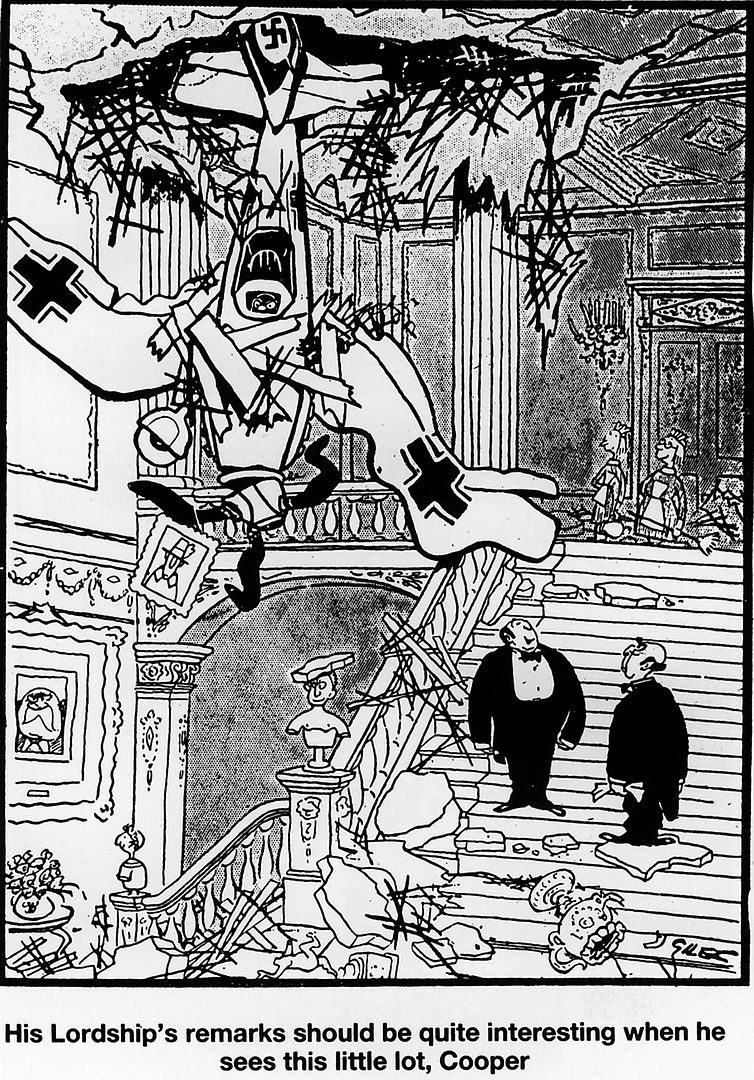 Carl Giles, Reynolds News, 17th November 1940. 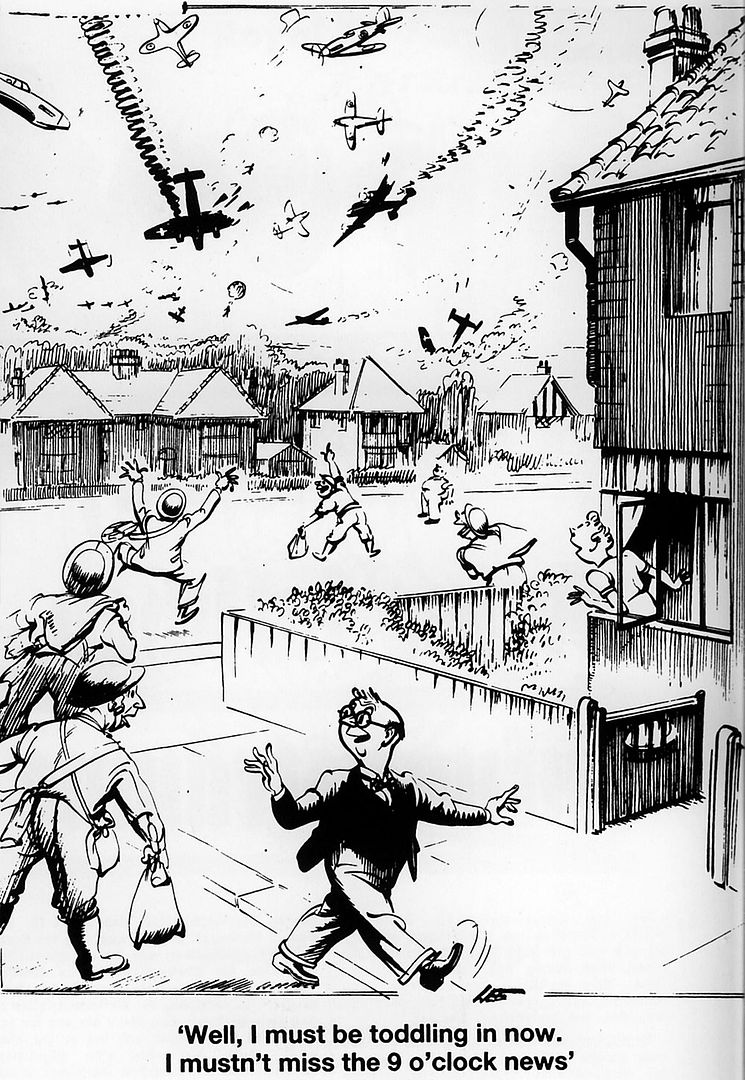 Joe Lee, Evening News, 1940. 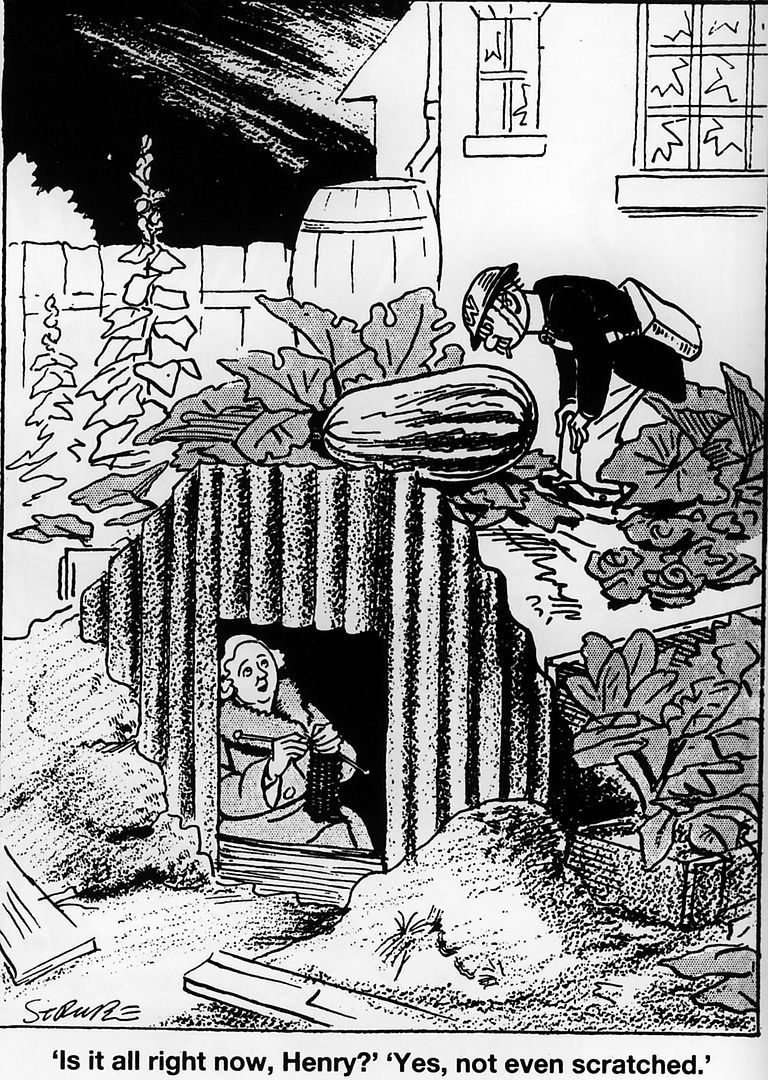 Sidney Strube, Daily Express, November 1940. 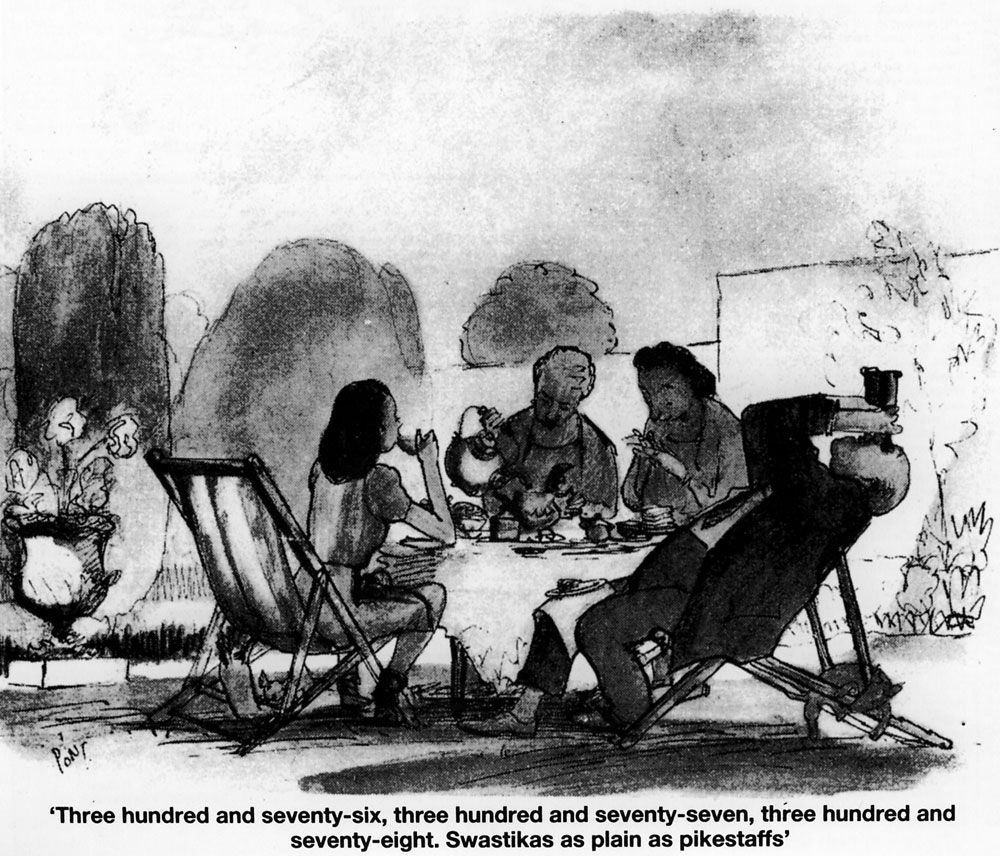 Pont, Punch, 25th September 1940.
My 'Waiting for Clod' thread: http://tinyurl.com/bqxc9eeAlways take sides. Neutrality helps the oppressor, never the victim. Silence encourages the tormentor, never the tormented.Elie Wiesel. Romanian born Jewish writer, professor, political activist, Nobel Laureate, Holocaust survivor. 1928 - 2016. Indeed the safest road to Hell is the gradual one - the gentle slope, soft underfoot, without sudden turnings, without milestones, without signposts. C.S. Lewis, 1898 - 1963.
|
|
#3168997 - 12/31/10 04:40 PM
 Re: While we're waiting for BoB SoW: WWII BBC RAF Broadcasts
[Re: RedToo]
Re: While we're waiting for BoB SoW: WWII BBC RAF Broadcasts
[Re: RedToo]
|
Joined: Nov 2005
Posts: 3,070
RedToo

Senior Member
|

Senior Member

Joined: Nov 2005
Posts: 3,070
Bolton UK
|
Part 94. 20. Hurricane Bomber Aircraft of Fighter Command this afternoon carried out a number of offensive patrols and sweeps over northern France and the coasts of Holland and Belgium. Hurricanes carrying bombs took part in one of these operations. (Air Ministry Communiqu�.) WHOEVER thought of fitting bombs to a Hurricane is to be thanked for giving the squadron which I command some of the most thrilling days' work that has ever fallen to the luck of Fighter Command pilots. Low-level bombing of ground targets by fighters which it makes possible is, of course, something quite new to R.A.F. pilots. In our Hurricane bombers we don't have to dive on to our targets. We come down almost to ground level before we reach them, and drop our bombs in level flight, with greater accuracy than can be achieved generally in dive-bombing. The whole thrill of the Hurribomber is in this ground-level flying over the target. There we are, like a close formation of cars sweeping along the �railway straight" at Brooklands, only, instead of fast car speeds, we are batting along at between 200 and 250 miles an hour. At times we may exceed 300 m.p.h. The impression and thrill of speed near the ground has to be experienced to be believed. Even though we are travelling so fast, there would be a risk of being hurt by the blast of our own bombs if they were of the ordinary type which burst on contact. Consequently our bombs are fitted with delayed-action fuses, so that they do not explode until we have got well outside their blast range. It might seem that, flying on to the target at only a few feet altitude, we would be easy prey for Bofors or machine-gun posts. We would be if the gunners could see us coming. But generally they cannot see the low-flying fighter until it is almost overhead, and then they have to be remarkably quick to get the gun trained on the fleeting aircraft. More�over, they have little time to calculate what deflections to allow in their aim. On the other hand, of course, the pilot would have precious little chance of baling out if his aircraft were hit. Indeed, he would have practically no space in which to regain control of his aircraft if a hit threw him temporarily out of gear. So far, however, the advantage seems to be on our side, and not on the side of ground defences. I have seen �flak� and machine-gun fire pelting at my aircraft from all angles, but none of it has hit me. We get intimate, if lightning, pictures of the countryside. People on the road, soldiers scrambling for cover, bombs bursting and throwing up debris around us. Our first big day out recently was typical of the work of this new weapon of ours. We went over in half a gale. The target we were looking for eluded us on this particular occasion. I think we passed it only a mile to one side. We did a circuit, and not seeing our main target, began to look for our alternative. I found myself flying down a river with a main line rail�road running alongside. Ahead was a bridge, carrying the railway over the river. I called to my companion that I would bomb the bridge, and together we swept over it, barely skimming the structure, and let our bombs go. Another pair in the squadron coming on behind saw the bombs explode in the river and the whole bridge slump to one side. As they passed over it, they saw the bridge looking as crooked as an eel. I looked back to see the effect of our bombs, but all I saw was a string of tracer bullets going up behind my port wing. As 1 turned again, I saw it was coming from a gun-post on an aerodrome which my companion and I were already traversing. I was half-way across it before I recognised it as an aerodrome, but I was in time to give some huts on the far edge a good burst from my guns. After this I made for the coast again, flying slap over a town and straight down one of its main streets. The squadron reassembled just off the coast, and we beat it back to our base. Altogether, it was what you'd call a party�or a rough house, according to whether you were at the receiving or the delivery end. And the only damage we sustained was a hole in a tailplane�and that was caused by a seagull! 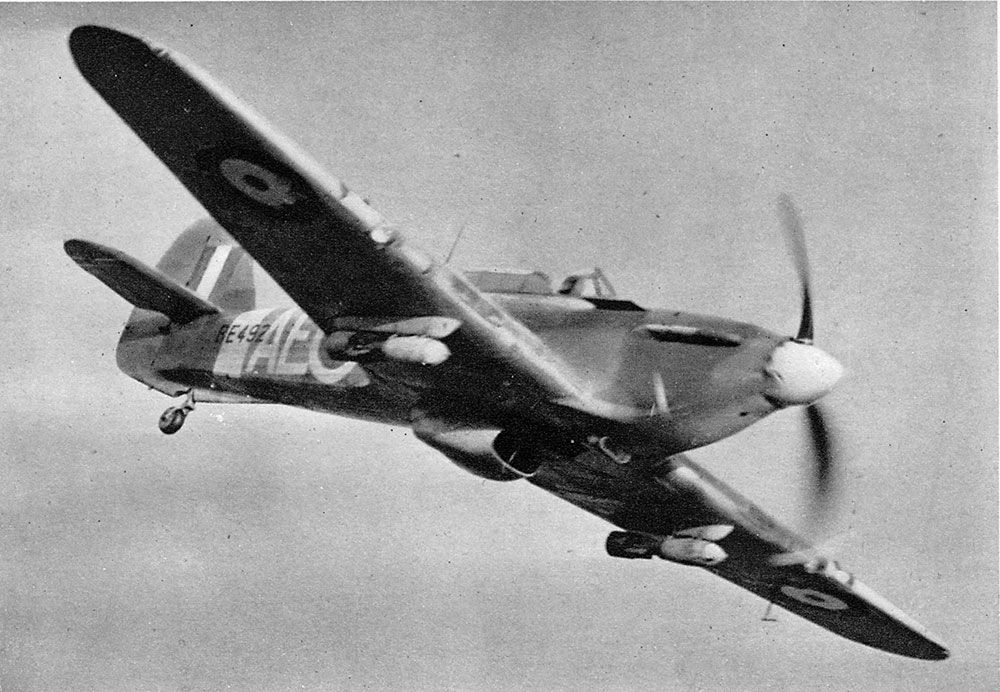 Hurricane fighter-bomber diving to attack. 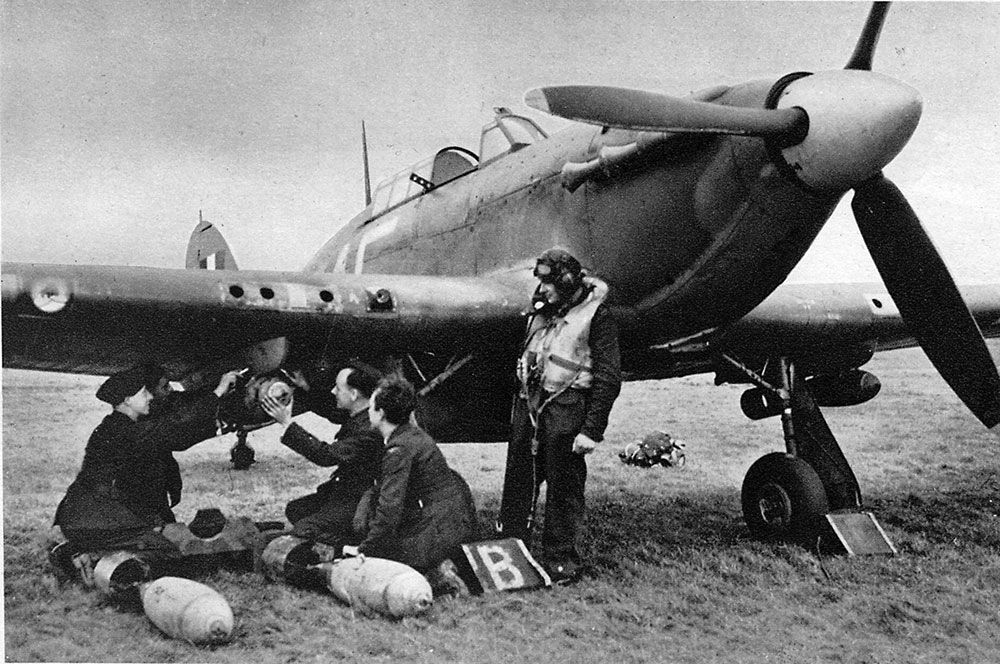 Bombing-up a fighter-bomber.
My 'Waiting for Clod' thread: http://tinyurl.com/bqxc9eeAlways take sides. Neutrality helps the oppressor, never the victim. Silence encourages the tormentor, never the tormented.Elie Wiesel. Romanian born Jewish writer, professor, political activist, Nobel Laureate, Holocaust survivor. 1928 - 2016. Indeed the safest road to Hell is the gradual one - the gentle slope, soft underfoot, without sudden turnings, without milestones, without signposts. C.S. Lewis, 1898 - 1963.
|
|
#3174215 - 01/07/11 09:20 PM
 Re: While we're waiting for BoB SoW: WWII BBC RAF Broadcasts
[Re: RedToo]
Re: While we're waiting for BoB SoW: WWII BBC RAF Broadcasts
[Re: RedToo]
|
Joined: Nov 2005
Posts: 3,070
RedToo

Senior Member
|

Senior Member

Joined: Nov 2005
Posts: 3,070
Bolton UK
|
Part 95. 21. R.A.A.F. to the Rescue A very cartridge saved the lives of a crew of an R.A.F. aircraft, when they were drifting in their rubber dinghy in the sea off the south-west coast of Britain. The crew were found by a searching Hudson, lost, and found again and a few minutes later they were picked up by a Sunderland flying-boat of an Australian squadron of the R.A.F Coastal Command, which alighted, and taxied up to them. (Air Ministry Bulletin.) IT was my flying-boat which picked up the Whitley boys from the Atlantic, but we only came in at the end of the job. If it hadn't been for a spot of good navigation by the Whitley crew themselves, and then by the Hudsons, these lads would never have been found at all. The Whitley crew sent out their position so exactly when they came down, and the Hudson navigators worked so well, that the leading Hudson was over the dinghy, dropping a bag of comforts, only fifty-nine minutes after taking off. In the comforts bag that was dropped were food, brandy and cigarettes. That's one way to get a smoke these days. We in the Sunderland were flying towards the last-known position of the dinghy. Then my wireless operator inter�cepted a message from one of the Hudsons: "Am over dinghy, in position so-and-so." We altered course for the new position, and at last came upon two Hudsons circling round in steep turns. Soon we got close enough to see the dinghy on the water. It was a dinghy made for only two men, but there were six in it. They gave us a cheer as we went over. We cracked off a signal to base that we were over them, and then I began to wonder about getting down to pick them up. It's a tricky business putting a big flying-boat down on a roughish sea in the Atlantic. A heavy wave can easily smash the wing-tip floats, or even knock out an engine as you touch down. We flew around, talking it over, and looking very hard at the sea. It wasn't too promising. The waves were about eight feet from trough to crest. But there was one good point�the wind was blowing along the swell, and not across it. We soon decided to have a try, and I picked out a comparatively smooth piece of water, about a mile from the dinghy. We landed all right. It was a bit bumpy, but it was all right. The next problem was to get the boys out of the dinghy and into the flying-boat. We taxied near to them. Two of my crew clambered into one of our own dinghies, at the end of a rope, and tried to paddle across to the Whitley dinghy. But the rope was too short. We tied another piece of rope on the end. It was still too short, even then. One of my crew then climbed out on the Sunderland's wing and fastened the end of the rope to the wing-tip. But by that time the Whitley dinghy had drifted away, out of reach. Then I thought we would tow our dinghy up to the Whitley's dinghy. We started up the engines, and moved off slowly, pulling our own dinghy along behind us. I'm afraid the lads in my dinghy got a bit wet. After a few minutes we brought both the dinghies together. They floated alongside the Sunderland itself. The Whitley dinghy seemed to be very crowded. When I took the crew aboard, I learned that their big dinghy had failed. So all of them had had to cram into the smaller one, which is designed to hold only two men. We pulled them aboard through the after-hatch of the Sunderland�and just about time, too. Their dinghy was gradually filling with water, and I doubt whether it would have lived through the night. It was only half an hour before dusk when we picked them up. They were quite all right, though. Just a bit tired. We gave them some hot tea and some food, and they turned in for a sleep on the way home. We did get one bit of amusement before we got back to base. . . . About thirty miles off the coast we saw beneath us one of the high-speed rescue launches, haring out towards the position where we had picked up the crew. We flashed a signal to the launch: "Have picked up six air crew from dinghy in position so-and-so." The launch flashed back only one word: "Blast!" and turned round and headed for home. Just one other point strikes me about this rescue incident. It had a fine international flavour. The British crew in the dinghy included one New Zealander. They were located by Lockheed Hudson aircraft built in California. And they were picked up by a flying-boat manned entirely by Australians. There seems to be a nice touch of co-operation about that. Pics on a seafaring theme, but nothing to do with air-sea rescue: The view a pilot has while coming in to land on one of the new Escort Carriers. Photos taken from a Swordfish. 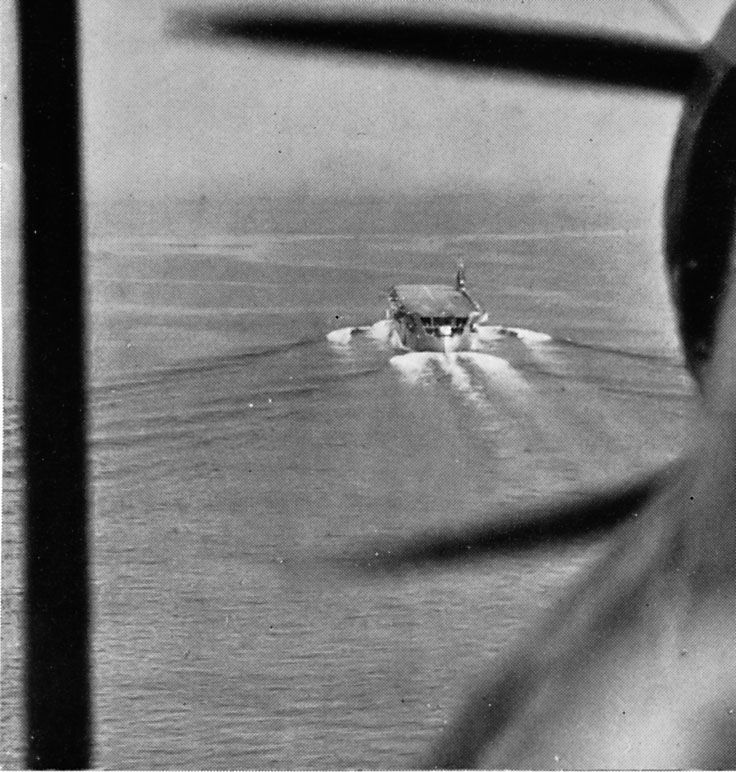 Four hundred yards away. 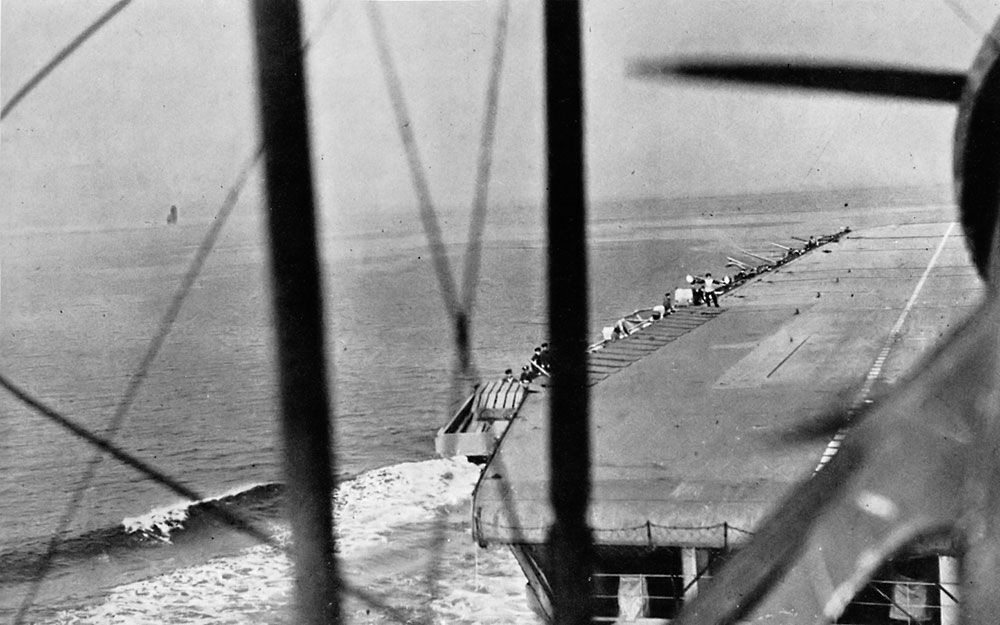 Fifty yards to go. The Deck Landing Control Officer signals the pilot that he is satisfied with his approach. Note how the nose of the aircraft is held well up. 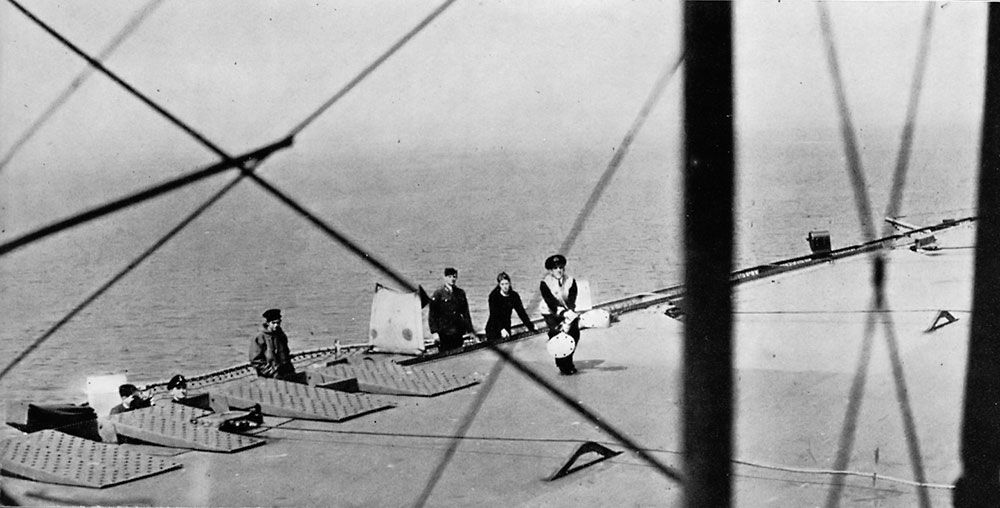 Only a few inches above the deck. The Control Officer gives the pilot the signal to cut his engine. Instant obedience is essential if the hook at the back of the aircraft is to pick up one of the arrester wires seen in the foreground.
Last edited by RedToo; 01/07/11 09:22 PM.
My 'Waiting for Clod' thread: http://tinyurl.com/bqxc9eeAlways take sides. Neutrality helps the oppressor, never the victim. Silence encourages the tormentor, never the tormented.Elie Wiesel. Romanian born Jewish writer, professor, political activist, Nobel Laureate, Holocaust survivor. 1928 - 2016. Indeed the safest road to Hell is the gradual one - the gentle slope, soft underfoot, without sudden turnings, without milestones, without signposts. C.S. Lewis, 1898 - 1963.
|
|
#3179802 - 01/14/11 10:32 PM
 Re: While we're waiting for BoB SoW: WWII BBC RAF Broadcasts
[Re: RedToo]
Re: While we're waiting for BoB SoW: WWII BBC RAF Broadcasts
[Re: RedToo]
|
Joined: Nov 2005
Posts: 3,070
RedToo

Senior Member
|

Senior Member

Joined: Nov 2005
Posts: 3,070
Bolton UK
|
Part 96. 22. Cologne�in Daylight Six squadrons of Blenheims of bomber command penetrated into the Rhineland this morning to attack the great Cologne power stations at Quadrath and Knapsack. Fighters accompanied the bombers as far as Antwerp. The bombers went on alone, often flying at less than 100 feet, on their 150 miles penetration of the German defence system. Both power stations were attacked at 11.30 a.m. at point-blank range. A great number of bombs scored direct hits and the targets were left in flames. (Air Ministry Communiqu�.) You may remember in the film �Target for To-night" a young airman goes around telling the crews where he thinks they're going. When asked how he could possibly know, he says, " I get around. I get the Gen." Two days before we attacked the power-house near Cologne, everybody on our station was getting around, getting the �Gen." We knew there was something big in the air, but no one was quite certain what it was. In fact, no one had the faintest idea. We were keyed up when we went into the briefing-room at 6.45 on the morning of the raid, and the Station Com�mander's opening remarks did nothing to lessen the tension. He started off by saying, �You are going on the biggest and most ambitious operation ever undertaken by the R.A.F." Then he told us what it was. Cologne, in daylight. One hundred and fifty odd miles across Germany at tree-top' height and then�the power-house. We were given the course to follow, the rendezvous with other squadrons of bombers, and the rendezvous with fighters. We were given the parting point for the fighters and the moment at which certain flights would peel off the formation for the attack on the second power-house, and then�in formation across Germany. Our orders were to destroy our objectives at all costs. While pilots and observers were getting all they could from the weather man, we rear gunners gathered round the signals officer for identification signs and then hurried out to get ready. Someone said, �What a trip!" and got the answer, �Yes, but what a target!� Knapsack, we were told, was the biggest steam power plant in Europe, producing hundreds of thousands of kilo�watts to supply a vital industrial area. If we got it, it would be as good as getting hold of a dozen large factories. One of the pilots on the raid was in civil life a mains engineer for the County of London Electricity Supply. He came away rubbing his hands and explained to us that, with turbines setting up about 3,000 revolutions a minute, blades were likely to fly off in all directions at astronomical speeds, smashing everything and everyone as they went. We crossed a fairly choppy sea to the mouth of the Scheldt, flying in probably the biggest formation of bombers ever to deliver a low-level attack. It was grand to see them. Even while we were attacking we knew that other bombers and squadrons of fighters were penetrating deep into the Pas de Calais. Over Holland we saw fields planted out in the pattern of the Dutch flag. People everywhere waved us on, there was a remarkable amount of red, white and blue washing about the place. I saw one Storm Trooper standing over a group of workers, and when he saw us he ran like a weazel. Near the frontier they did not wave, they just watched us. In Germany itself men scuttled off for shelters. During the whole of our trip we saw no motor transport of any kind. I was sitting in the rear turret and I didn't know we were over the target until I saw the power-house chimneys above me�four on one side, eight on the other. Then the observer called out, �Bombs gone," and as I felt the doors swinging to, the pilot yelled, �Machine gun!� I burst in all I could as we turned away to starboard. Three miles off I had a good view of the place. We had used delayed-action bombs, and banks of black smoke and scalding steam were gushing out. Debris was rocketing into the air, and I thought of those turbine blades ricochetting around the building. On the way back we kept sufficiently good formation to worry attacking Me. 109's. The first I knew of them was the leading air-gunner calling out: �Tally-ho! Tally-ho! Snappers to port beam. Up five hundred." The attack went on for eight minutes until they broke off and another formation of twelve enemy snappers came into action. They left us when they saw our own chaps coming out to meet us. Some odd things happened on this raid. One draughty hole in a front perspex was stopped by the gallant observer sticking his seat in it to keep out the gale. Over Holland we flew into hosts of seagulls, and some aircraft brought back specimens stuck in their engine cowling, so giving rise to the suggested Dutch communiqu�, " And from these operations five of our seagulls failed to return." Twelve ducks also failed to return; one of our aircraft came back with them inside it, all of them dead. But I should think the oddest things of all must have happened inside that power-house at Knapsack. When we got back we astonished a few people on our station when we told them where we had been. Sometimes we get around too. We also get the �Gen," and we cer�tainly got the target. 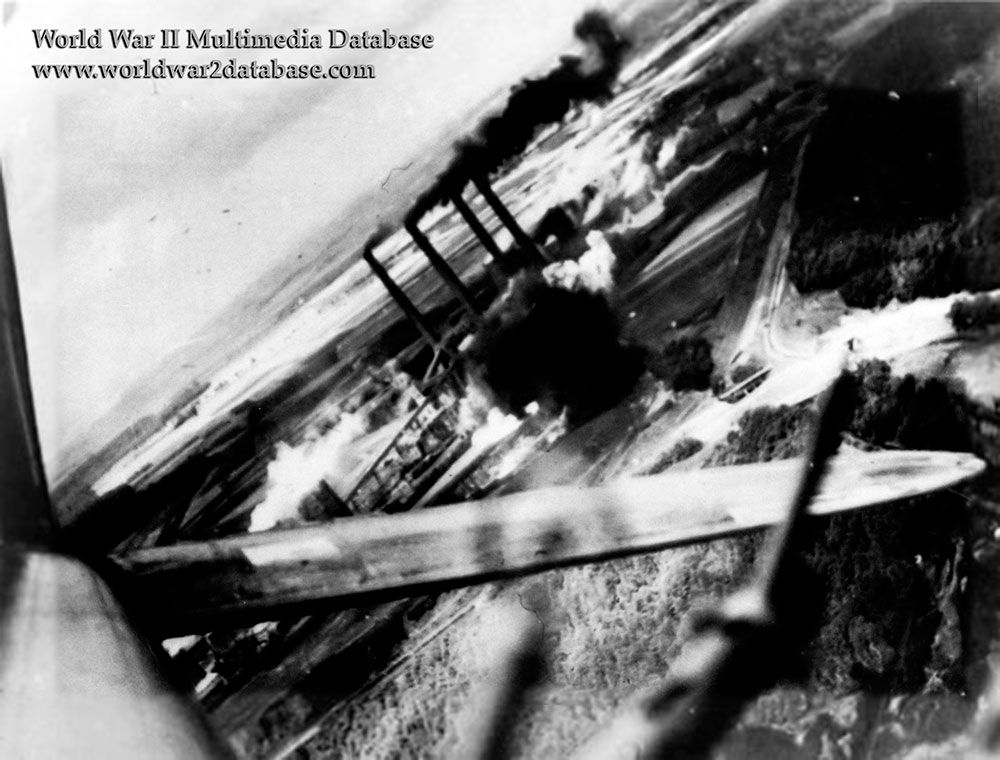 A Bristol Blenheim Mark IV of the Royal Air Force's Number 2 group pulls away after a successful attack on the Fortuna Power Station in Quadrath. You can see the end of the dorsal turret Vickers .303 machine gun lower right. Two power stations, Fortuna I and II, burning lignite (brown coal), were run by Rheinische Aktiengesellschaft fur Braunkohlenbergbau und Brikettfabrikation or RAG (Rhine Public Company for Brown Coal and Briquette Manufacturing) in the small village of Quadrath. Another target was the Goldenberg-Werk Power Station in nearby Knapsack. Fifty-four Blenheims were detailed for a low-level raid, coming in over the Netherlands to attack, causing significant damage. The Blenheims came from 18, 21, 82, 107, 114, 139 and 226 Squadrons, commanded by Wing Commander Nichol in his first Blenheim mission (????-1941) and navigated by Officer (later Wing Commander) Thomas Baker (1914-2006) who later said the mission was "almost suicidal - it was the only time in my life that I saw my fellow aircrew grey and shaking." Ten of the Blenheims were shot down and others were damaged, mostly to the large anti-aircraft concentrations around the plants. The power stations were heavily damaged. While the bomb run on the plant had no fighter cover, Supermarine Spitfires of 306 and 315 Squadrons covered the incoming flight, 308 Squadron with Spitfire VBs and 263 Squadron with Westland Whirlwinds flew top cover, and three other squadrons flew cover for the fighters. 485, 610 and 452 Squadrons, all flying Spitfires, and three other squadrons of Sprtfire VBs struck airfields and targets along the French and Dutch coasts. Lacking the range to get within 100 miles of Cologne, the Blenheims went in on their own; all the Spitfires had to withdraw after five minutes of loitering in the formation area over Holland. 19, 65 and 226 Squadrons, flying the standard short-range Spitfire II, and 66, 152, and 234 Squadrons, all flying the longer-ranged standard Spitfire IIA, rendezvoused with the Blenheims on their return. 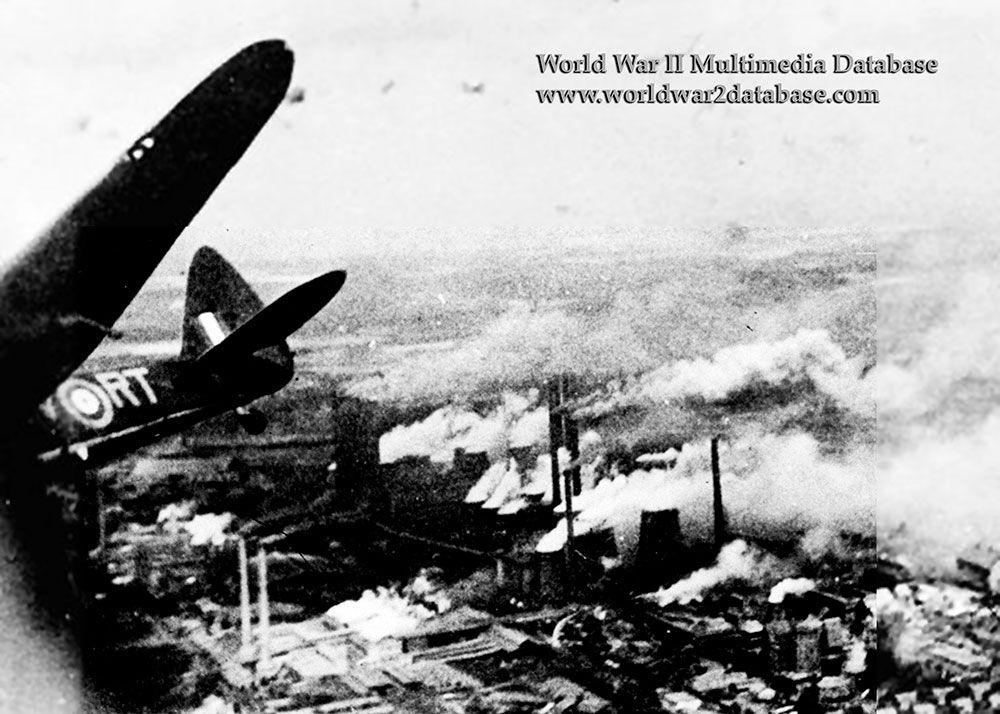 A Bristol Blenheim Mark IV (extreme left), serial V6391, marked RT-V of 114 Squadron, 2 Group, Royal Air Force, banks away after releasing two 500-pound (227-kilogram) bombs over the Goldenburg-Werk lignite (brown coal) power station in Knapsack. V6391, piloted by Sergeant (later Air Marshal) Ivan Gordon Broom (June 2, 1920 - January 24, 2003) and crewed by Sergeant William "Bill" North, Navigator, and Sergeant Leslie Harrison, Weapons Operator and Aerial Gunner. Fifty-four Blenheims made a daring daylight raid on two power stations near Cologne run by Rheinische Aktiengesellschaft fur Braunkohlenbergbau und Brikettfabrikation or RAG (Rhine Public Company for Brown Coal and Briquette Manufacturing). They were escorted by fifteen squadrons of Supermarine Spitfires and 263 Squadron flying Westland Whirlwinds, but none of the fighters had the range to make it all the way to the target, so the Blenheims went in on their own. Broom was noted as one of the flew pilots of 2 Group who did not consider the mission a suicide run. He relished the enthusiastic reaction of the Dutch public, who greeted the low-flying Blenheims with waving and cheers, which abruptly stopped when V6391 crossed into Germany. This photo ran in the Illustrated London News, which syndicated the photo around the world without Brown or his crew being named. The Goldenburg power station was severely damaged, but power was restored to the Ruhr factories. Brown and his crew were sent to the Far East in September 1941, but were "hijacked" in Malta, where they were ordered to fly anti-submarine patrols and attack airfields in Sicily and Italy. On their first flight out of Malta, Broom and North used an Aldis signal lamp to guide a stricken Blenheim back to base. With most of the senior officers dead or missing, Brown was given command and won his first Distinguished Flying Cross, eventually surviving 30 missions. Brown was a popular leader who shared his men's risks. 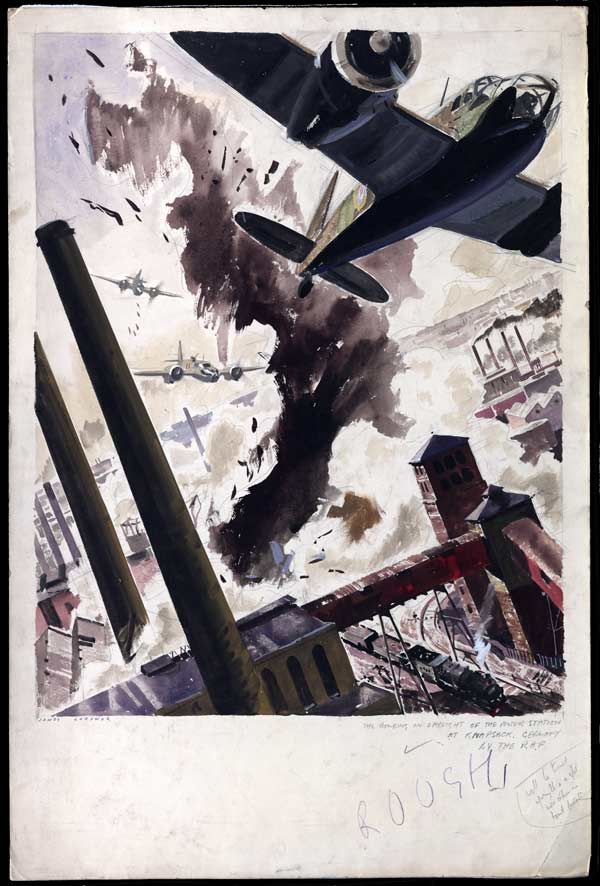 "Bristol Blenheims" by James Gardner, 1941 This �rough' by James Gardiner shows Bristol Blenheims conducting a daylight raid on the German power stations at Knapsack and Quadrath near Cologne, 12 August 1941. Transcription: ROUGH � In blue pastille. The bombing in daylight of the power station at knapsack Germany by the RAF� Directly beneath picture on right hand side Will be turned upright + a spot more colour in bomb bursts On right hand side with line around � artist's comment
My 'Waiting for Clod' thread: http://tinyurl.com/bqxc9eeAlways take sides. Neutrality helps the oppressor, never the victim. Silence encourages the tormentor, never the tormented.Elie Wiesel. Romanian born Jewish writer, professor, political activist, Nobel Laureate, Holocaust survivor. 1928 - 2016. Indeed the safest road to Hell is the gradual one - the gentle slope, soft underfoot, without sudden turnings, without milestones, without signposts. C.S. Lewis, 1898 - 1963.
|
|
#3185319 - 01/21/11 09:07 PM
 Re: While we're waiting for BoB SoW: WWII BBC RAF Broadcasts
[Re: RedToo]
Re: While we're waiting for BoB SoW: WWII BBC RAF Broadcasts
[Re: RedToo]
|
Joined: Nov 2005
Posts: 3,070
RedToo

Senior Member
|

Senior Member

Joined: Nov 2005
Posts: 3,070
Bolton UK
|
Part 97. 23. Torpedo-Bomber Gets Home Beaufort aircraft of Coastal Command, continuing the hunt for enemy shipping off the south-west coast of Norway to-day, located a German convoy and torpedoed a supply vessel. (Air Ministry Bulletin.) I'm from the Isle of Man. My observer � we call him "Daddy" because he is twenty-eight and a year older than I am�comes from Beckenham in Kent, the rear gunner from Camberwell, and the wireless operator from Streatham. Both of these boys are in hospital wounded at the moment, but I hope they will soon be back in my aircraft again. We carry torpedoes on our Beauforts, and the other day we were ordered to attack a convoy of large enemy ships off the coast of Norway. Three aircraft were to go, led by the Squadron Commander. Unfortunately, my aircraft was delayed a little in getting off the ground, and as such operations are worked to the split second, the other two Beauforts went on ahead. We had about three hundred miles to go before reaching Norway, and before getting there I did everything to catch up with the other two aircraft, but I couldn't�though I ran into evidence of their work. There was a big black pall of smoke on the horizon, just where we knew the convoy to be, and I soon saw it to be a large ship on fire and listing over. I picked another ship of about 7,000 tons, went in and released my torpedo. At that second Charlie�that's the rear gunner from Camberwell�yelled through the intercom., " Look out, skipper�Messerschmitts!" At the same moment I heard the rattle of a German's guns and the pouf of his cannon shell. The Messerschmitt hit us first time, and I saw tracers going past my head. Then the gunner yelled again, "Another one coming in, skipper." They hit us again. I heard our guns going all the time. Charlie, very calmly, said, "I think I got him"; then a second later, "Here comes another from the beam." There was a terrific explosion at the back, and the rear guns stopped. "Daddy," the observer, crawled back, and a few seconds later came to tell me, "Charlie's been hit pretty badly." All this time I was throwing the aircraft about, but we were then only about 20 feet above the water. All the time the two Messerschmitts were coming in and letting us have I everything they'd got from 20 yards. Every time they hit us my Beaufort shuddered, and I had to fight the controls to keep her out of the sea. Later I found that the rear gunner, who had been unconscious, had come to, and had opened up again. We are certain he got one of the Messerschmitts. He filled its belly with lead at less than 20 yards, and didn't see anything more of the Jerry. Then the rear guns stopped again, and I was chased all over the place. There was some inviting cloud, but I couldn't get the aircraft higher than a few feet, we were so badly hit. I thought a thousand times that we must go into the ditch. But I had to laugh when the observer calmly pulled out his watch and announced that the scrap had lasted for nearly twenty minutes. Our guns began again. I said, "By God, those boys are all right." They had dragged themselves up to the guns and were still fighting. Then the one remaining Messerschmitt came round the front of us. He must have thought we were finished, but after one more squirt from our guns he turned away in a hurry. We didn't see him again. We had to get home then, and we found that we were heading south instead of west, with about three hundred miles to go in a damaged aircraft. We were just skimming the waves. It was raining hard, blowing a gale, and all the perspex�that's the glass�had been shot away. We were wet and miserable, and there were two men behind badly hurt. I said, "We'll have to go down in the water," but then we found that the rear gunner and wireless operator had collapsed and couldn't move. We were still only just above the sea. So we decided to try to get home, and we took off our Mae Wests to make a bed for Charlie, as he was really hurt. It took three hours before we made a landfall, and then we were about two hundred miles south of where we should have been. That's how we had been chased. When I tried to turn the aircraft right, I found that she wouldn't turn, although I managed to coax her to 80 feet. So we turned out to sea again in a wide circle to the left, and lost sight of land. Anyhow we got home at last. But, on getting ready to land, I saw the undercarriage swinging about in the breeze. So I just prayed and crash-landed. I was amazed that the Beaufort ever got home after all she'd been through. This is the last BBC broadcast from the 1942 book �We speak from the air�. 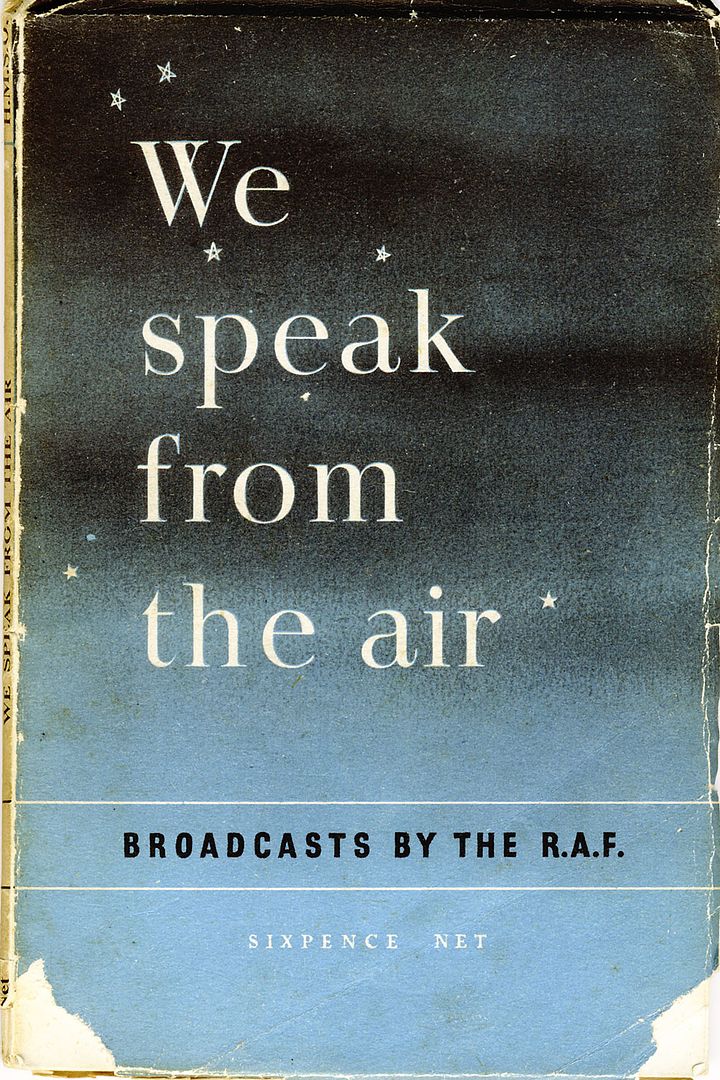 However IL2 CoD (I�d like to meet the person responsible for the change of name) is still near the horizon, so the stories will continue, taken from various war time publications. 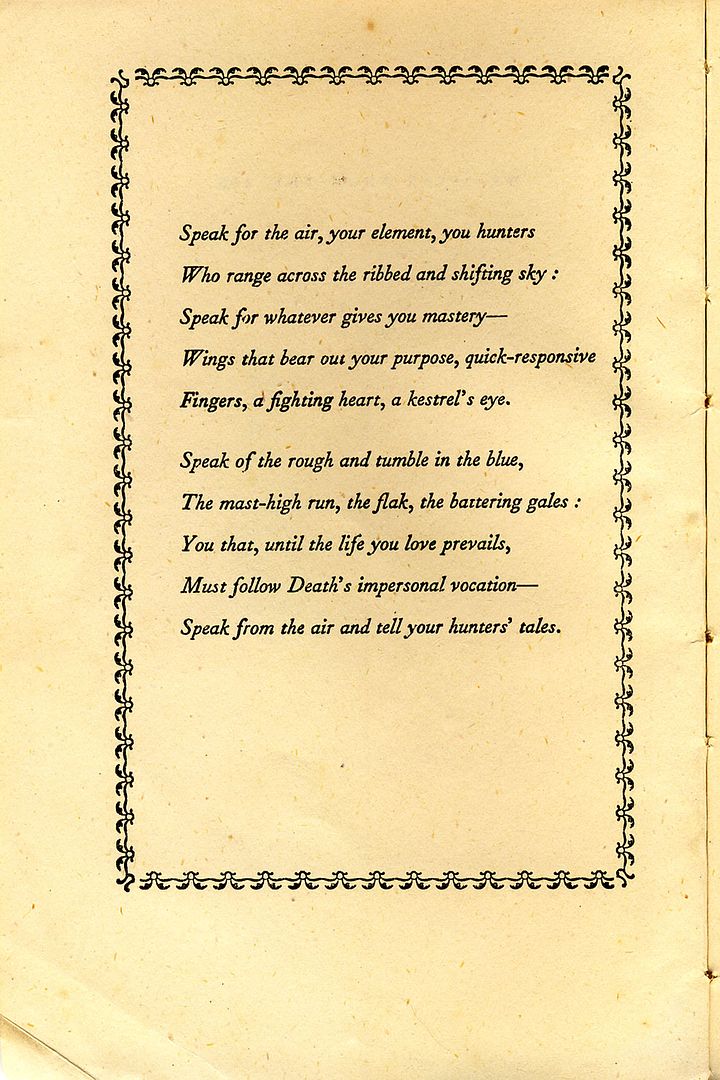 See you next week. RedToo.
Last edited by RedToo; 01/21/11 09:08 PM.
My 'Waiting for Clod' thread: http://tinyurl.com/bqxc9eeAlways take sides. Neutrality helps the oppressor, never the victim. Silence encourages the tormentor, never the tormented.Elie Wiesel. Romanian born Jewish writer, professor, political activist, Nobel Laureate, Holocaust survivor. 1928 - 2016. Indeed the safest road to Hell is the gradual one - the gentle slope, soft underfoot, without sudden turnings, without milestones, without signposts. C.S. Lewis, 1898 - 1963.
|
|
|
|